Income disparity is a fact of life. I am not a Marxist and I reject the notion that it is purely luck or at the expense of others that great fortunes can be made. But I do recognize both a historical and practical problem of a society in which disparity is so great the lower classes have no realistic hope of ever overcoming the status quo.
Apartheid may be officially over in South Africa, but it is not really over.
I live in Los Angeles and there is a certain beauty to parts of my county…you cannot beat driving down Pacific Coast Highway and observing the beautiful combination of nature and palatial homes of Malibu.
Table Mountain in Cape Town reminded me a lot of Malibu. The homes were beautiful…some of them downright stunning, as was the lush greenery and the spectacular view of blue skies and blue water. It was breathtaking really. Now this is somewhere I could see myself living, I mentioned to my wife.
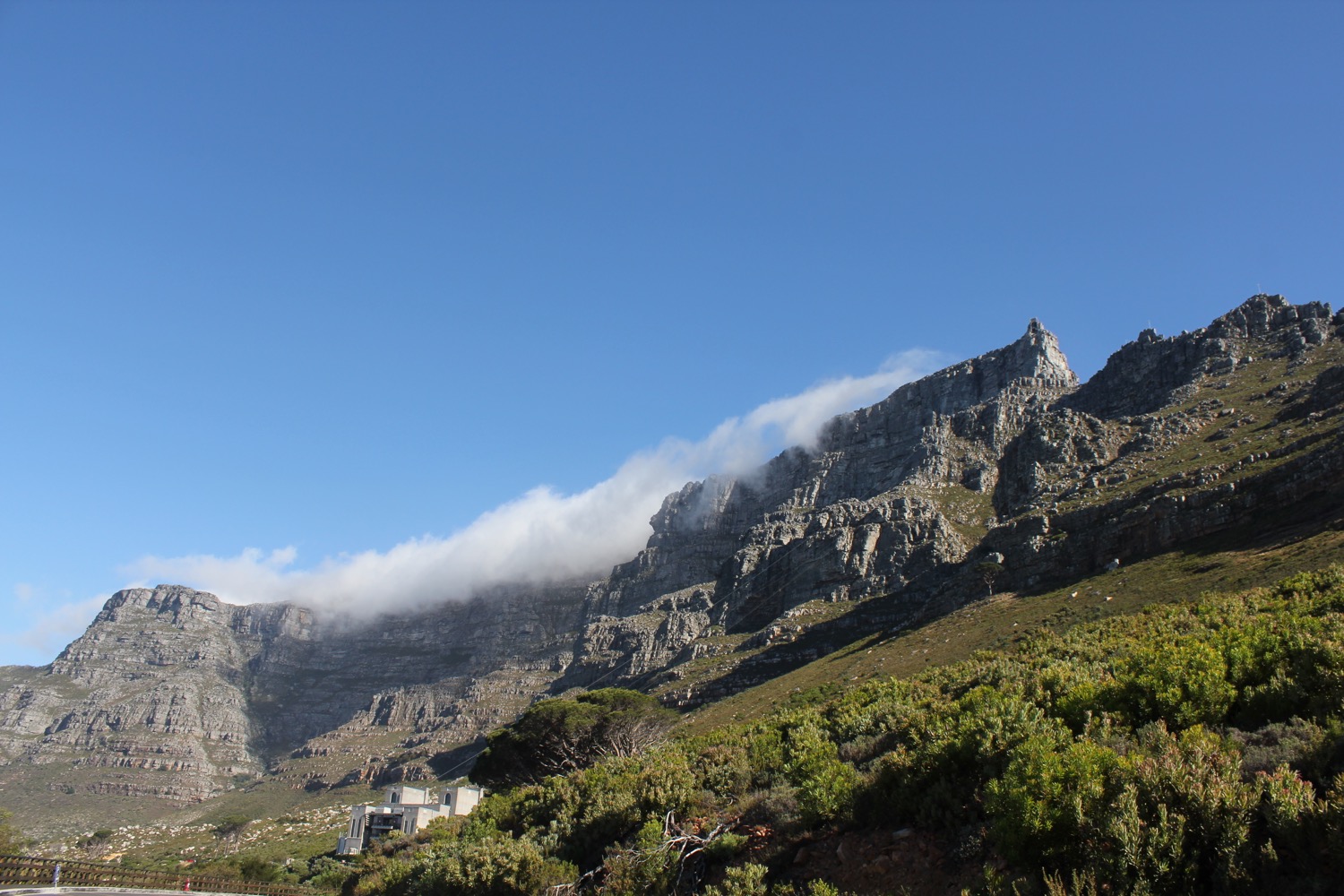
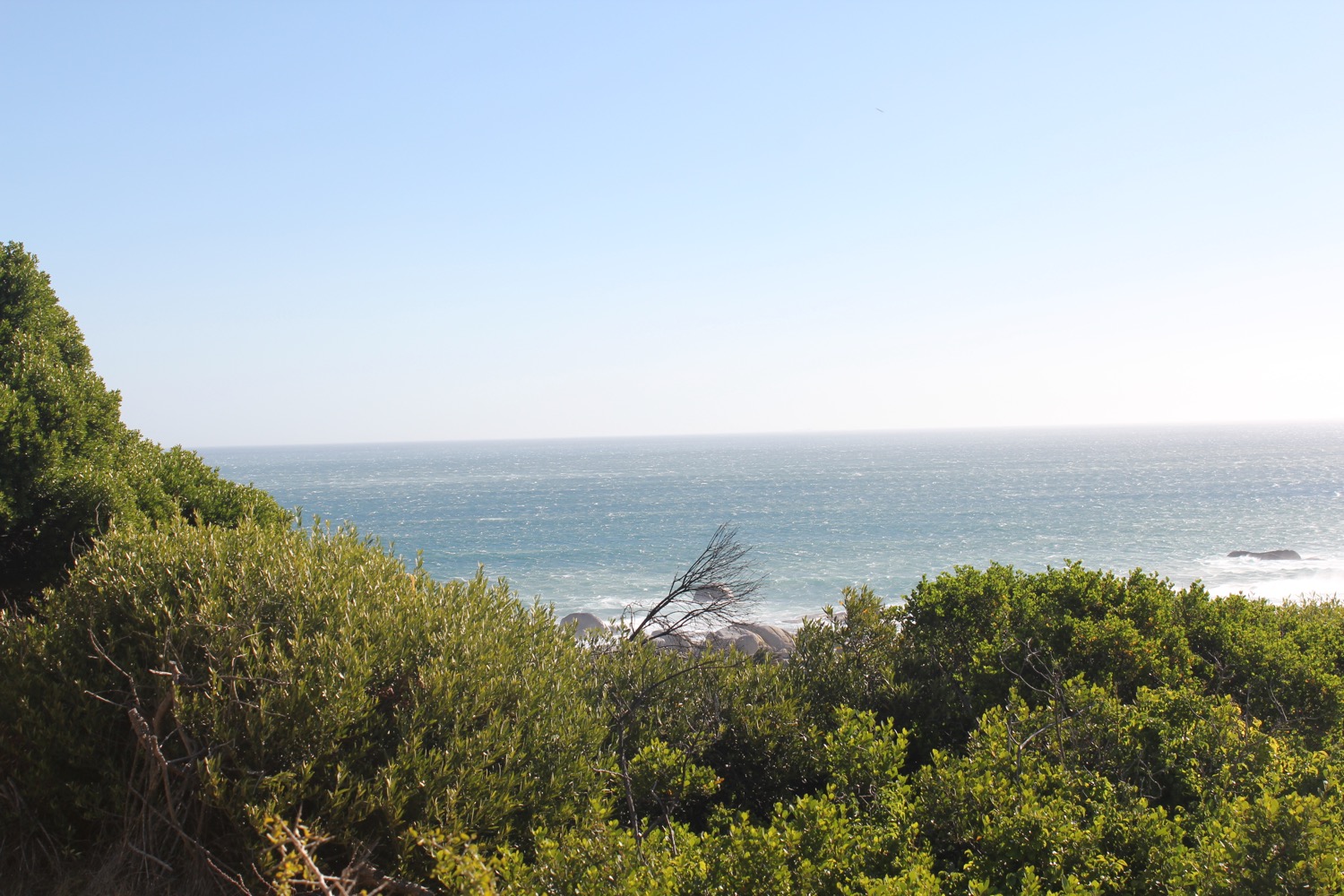
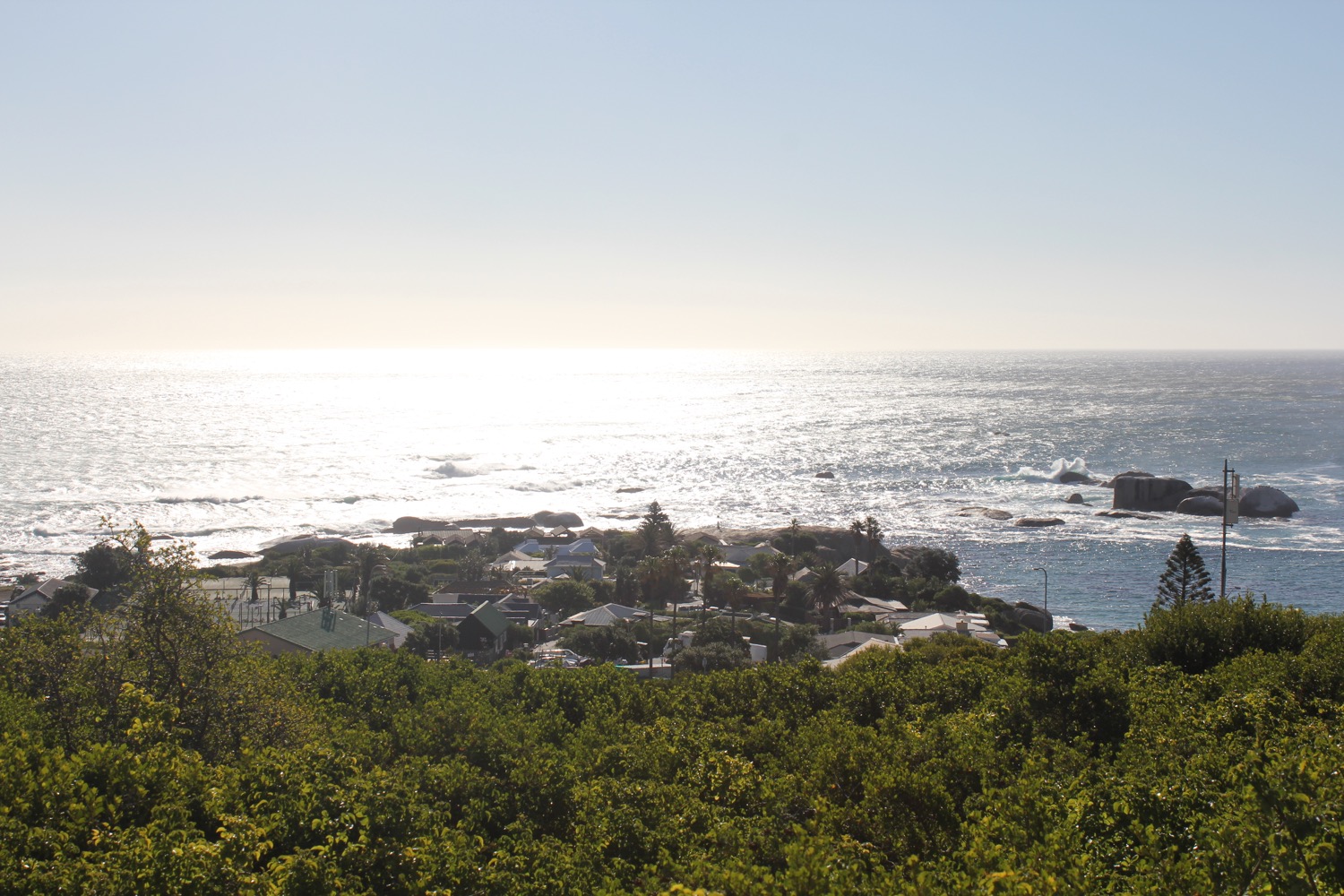
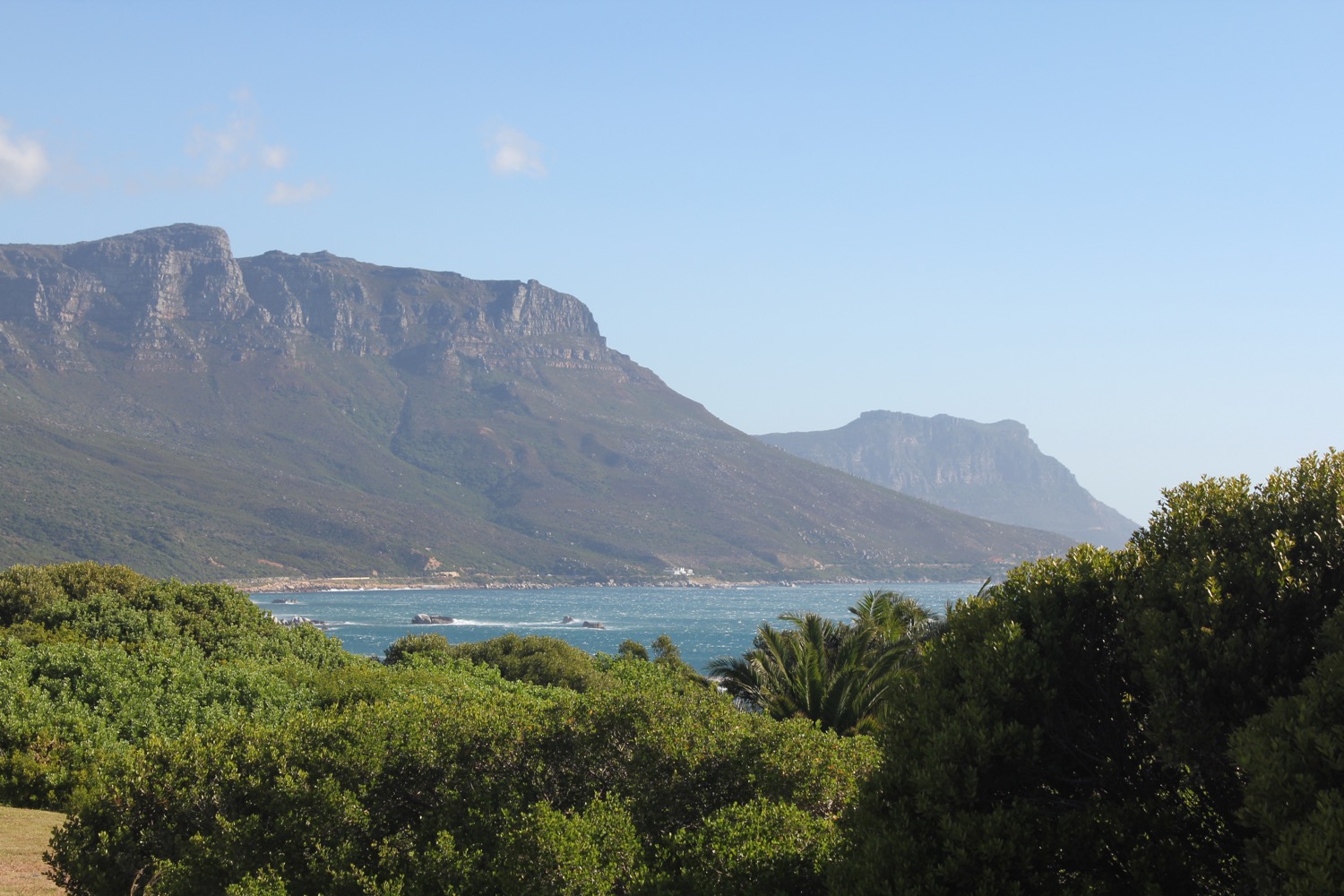
Neither of us were familiar with the area and made a reservation at a home we thought was in town but turned out to be in a suburb about nearly an hour away in Somerset West.
After a wonderful lunch and walk around Cape Quay followed by the drive up Table Mountain, we began the journey to our guest house for the night –
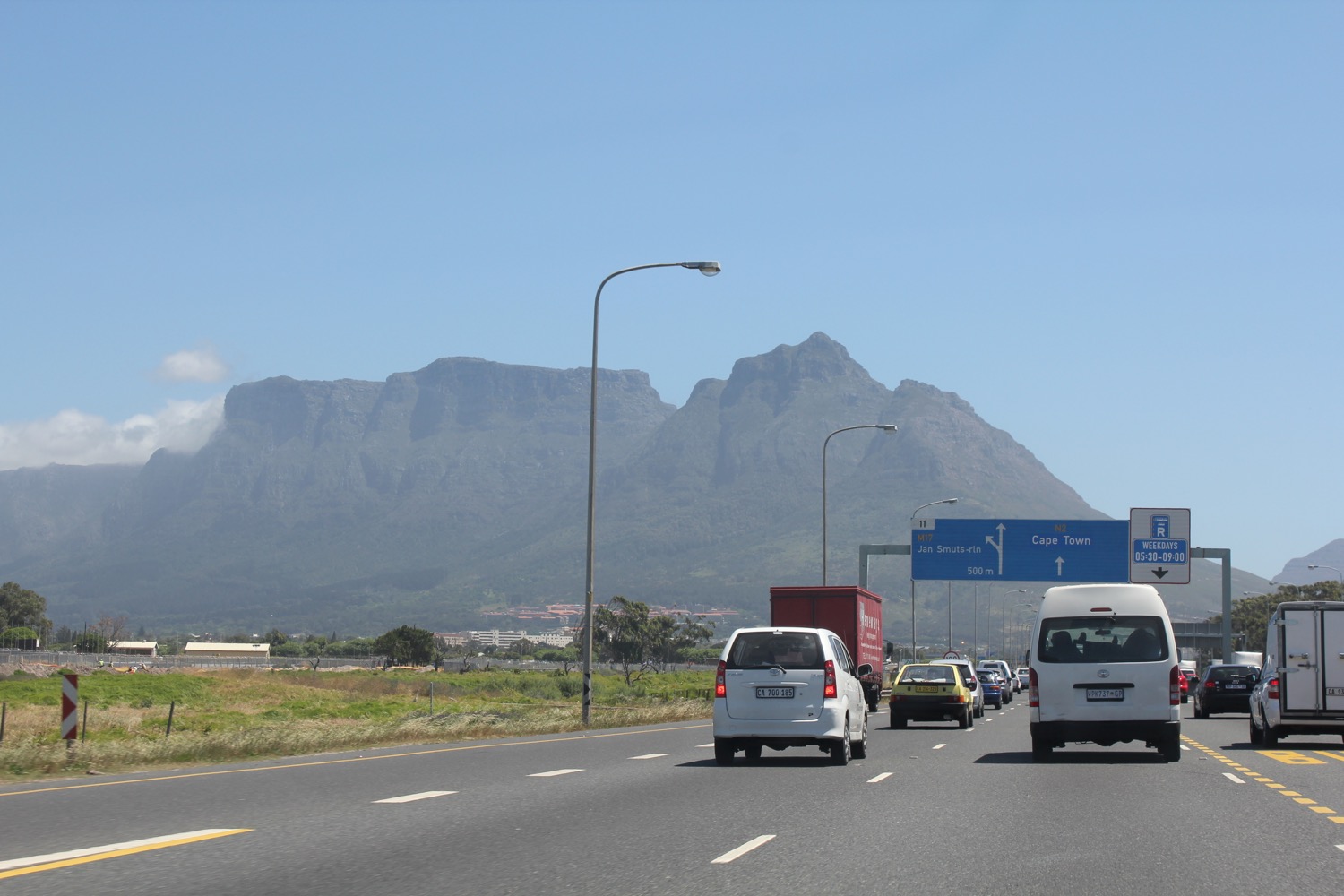
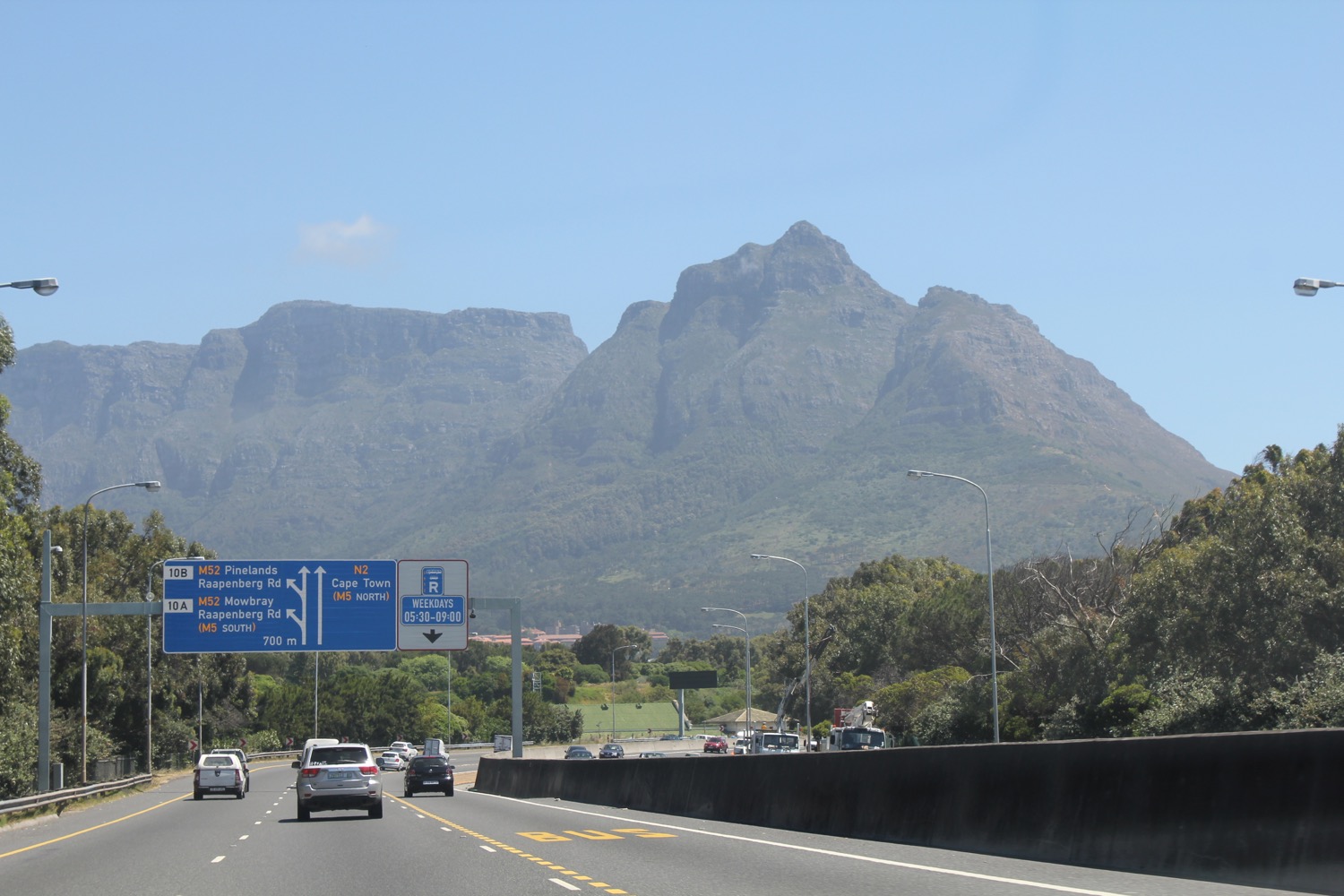
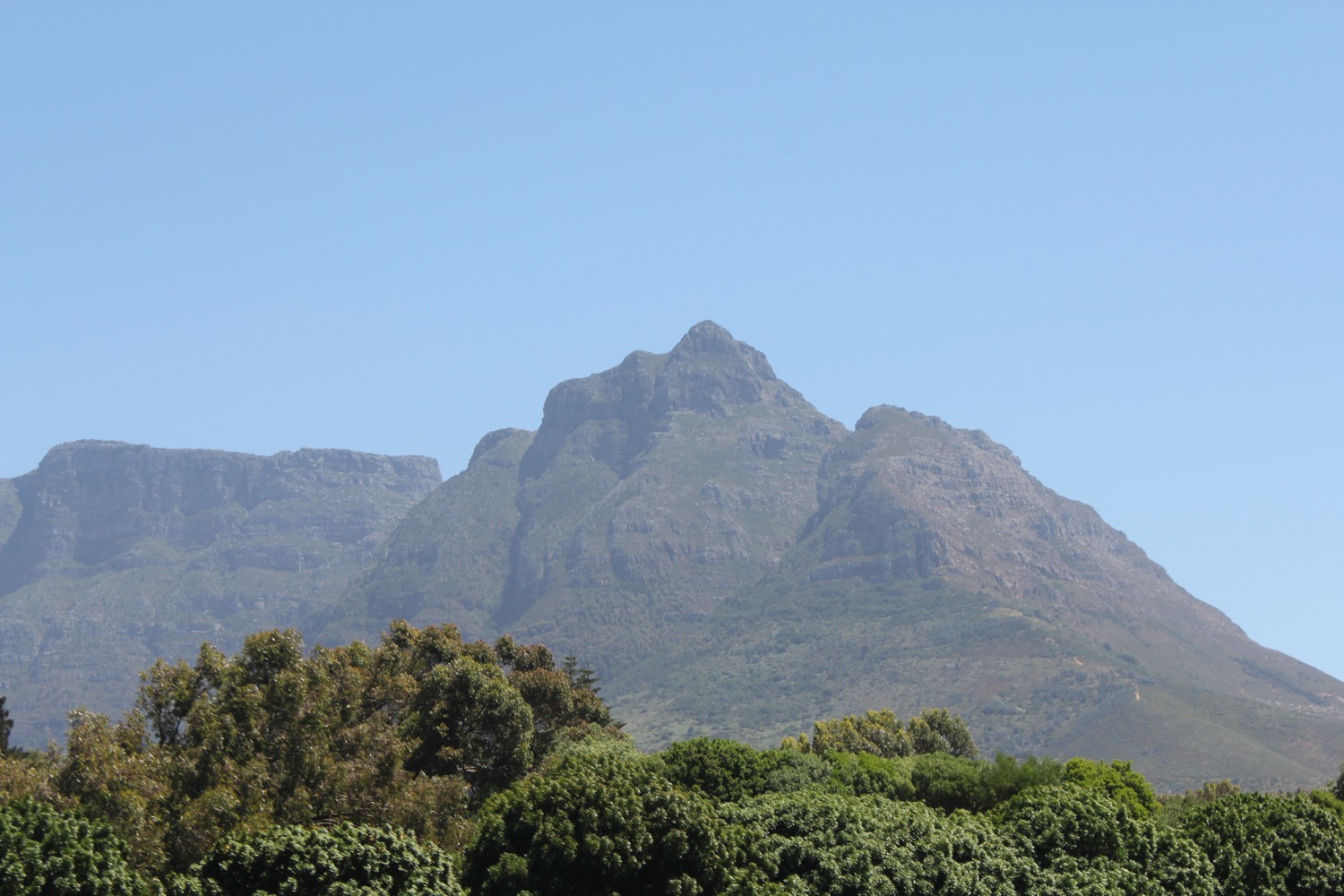

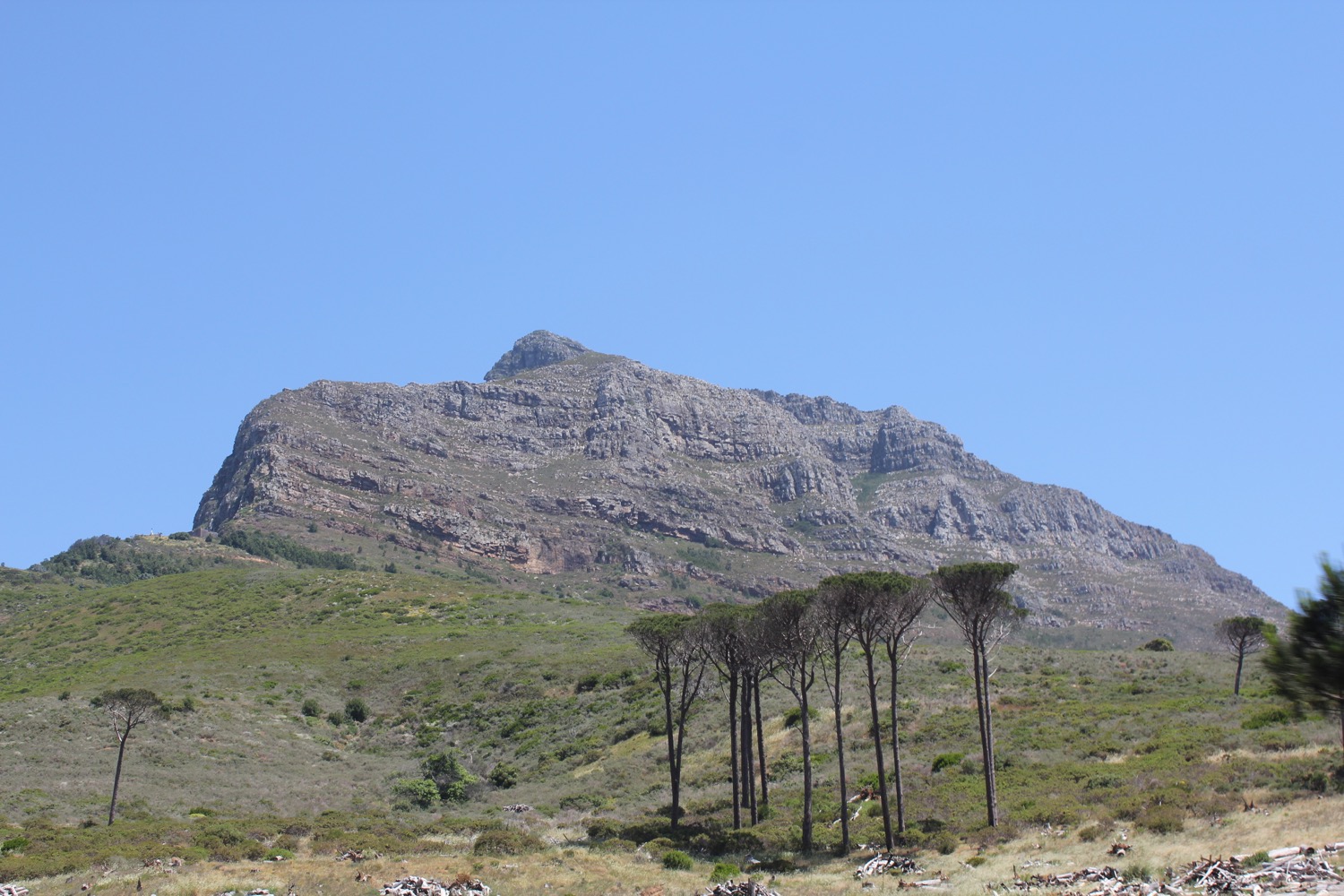
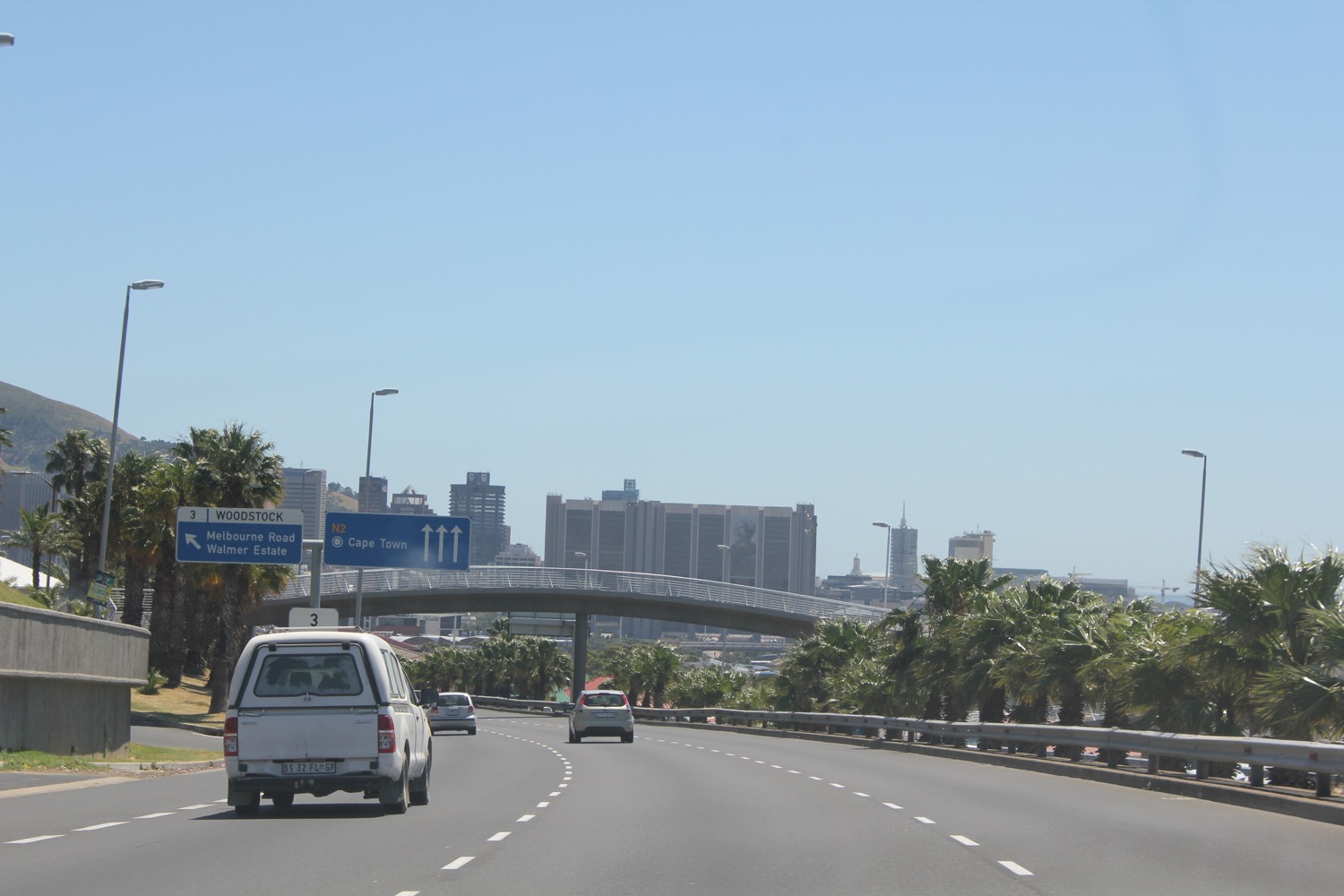
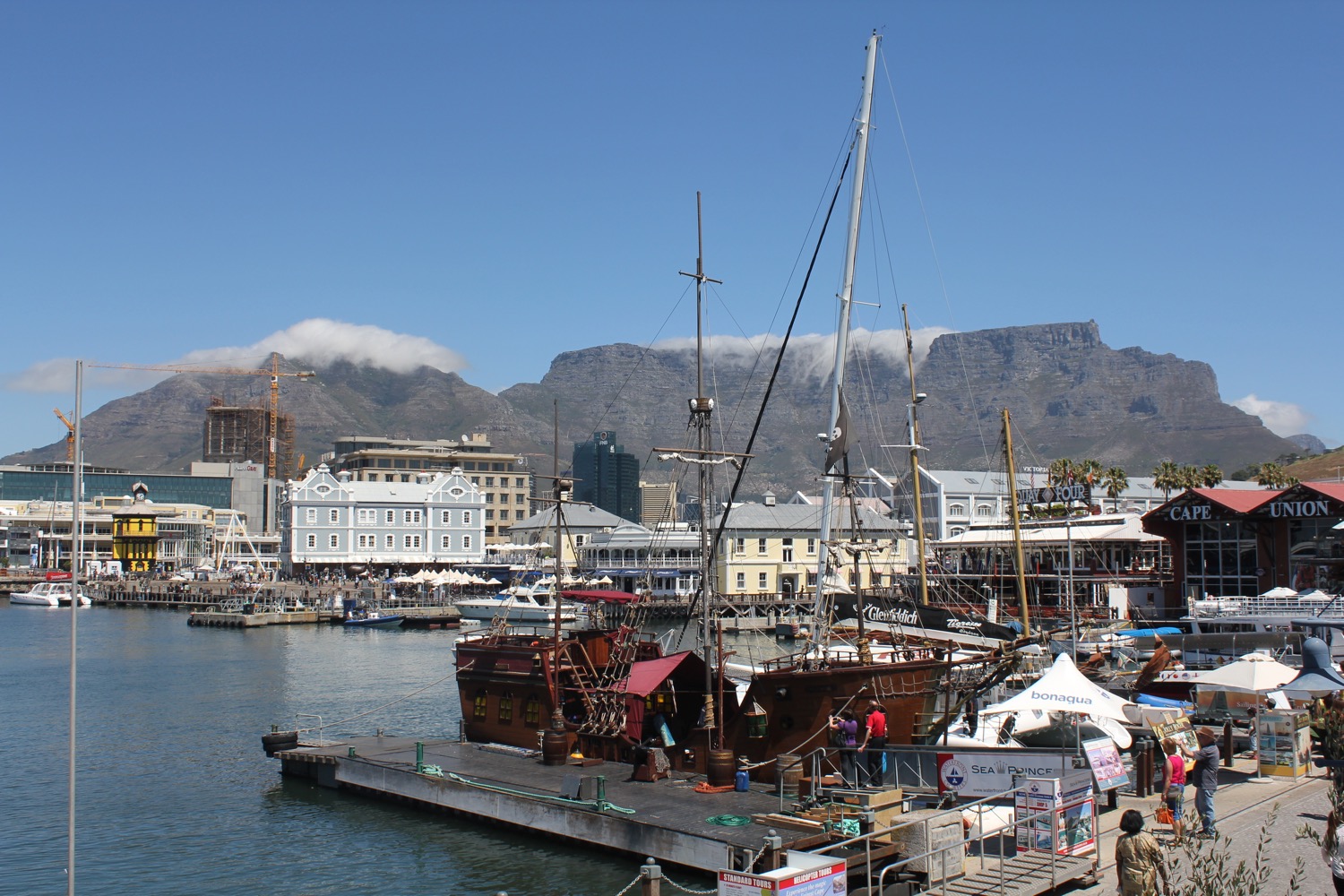
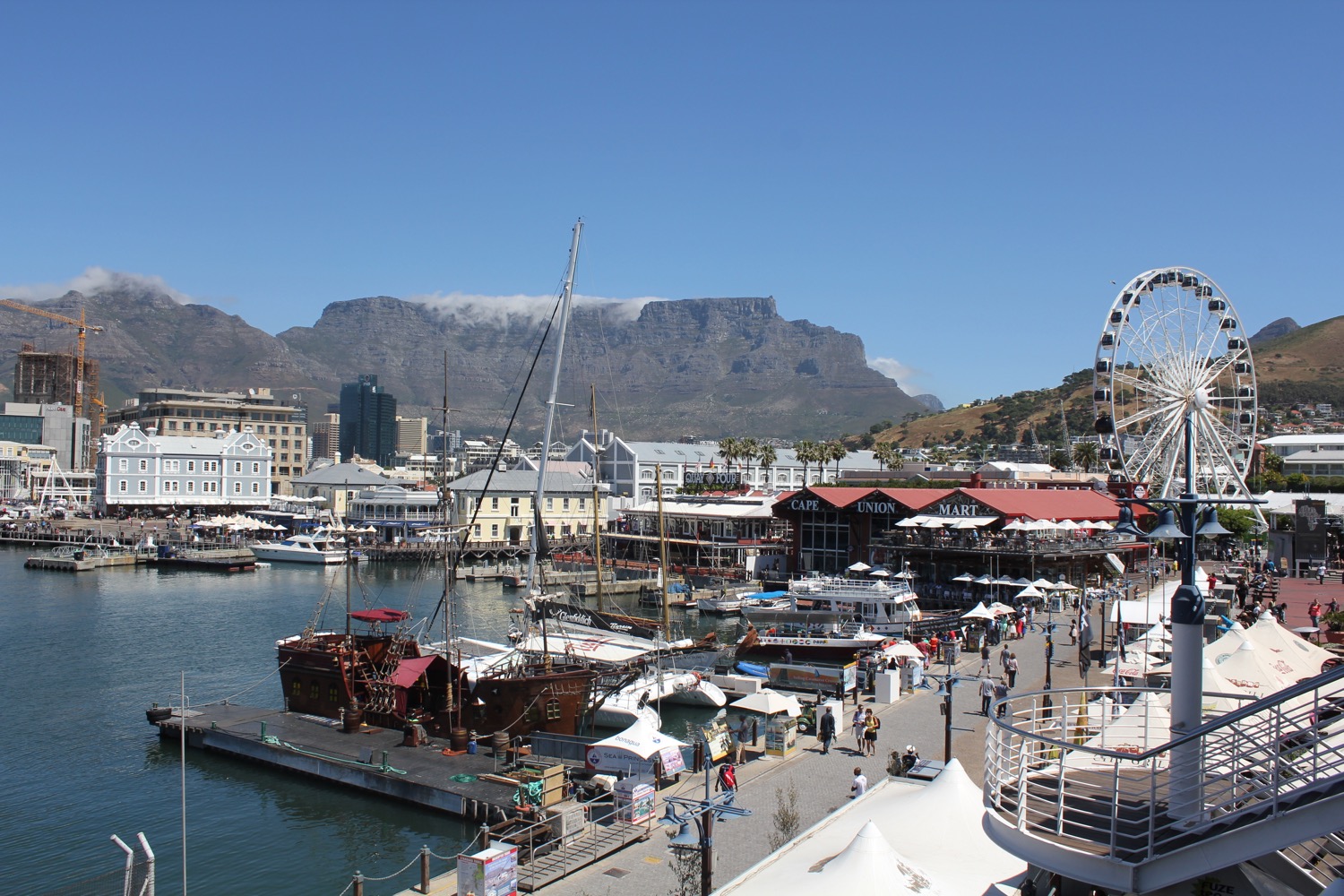
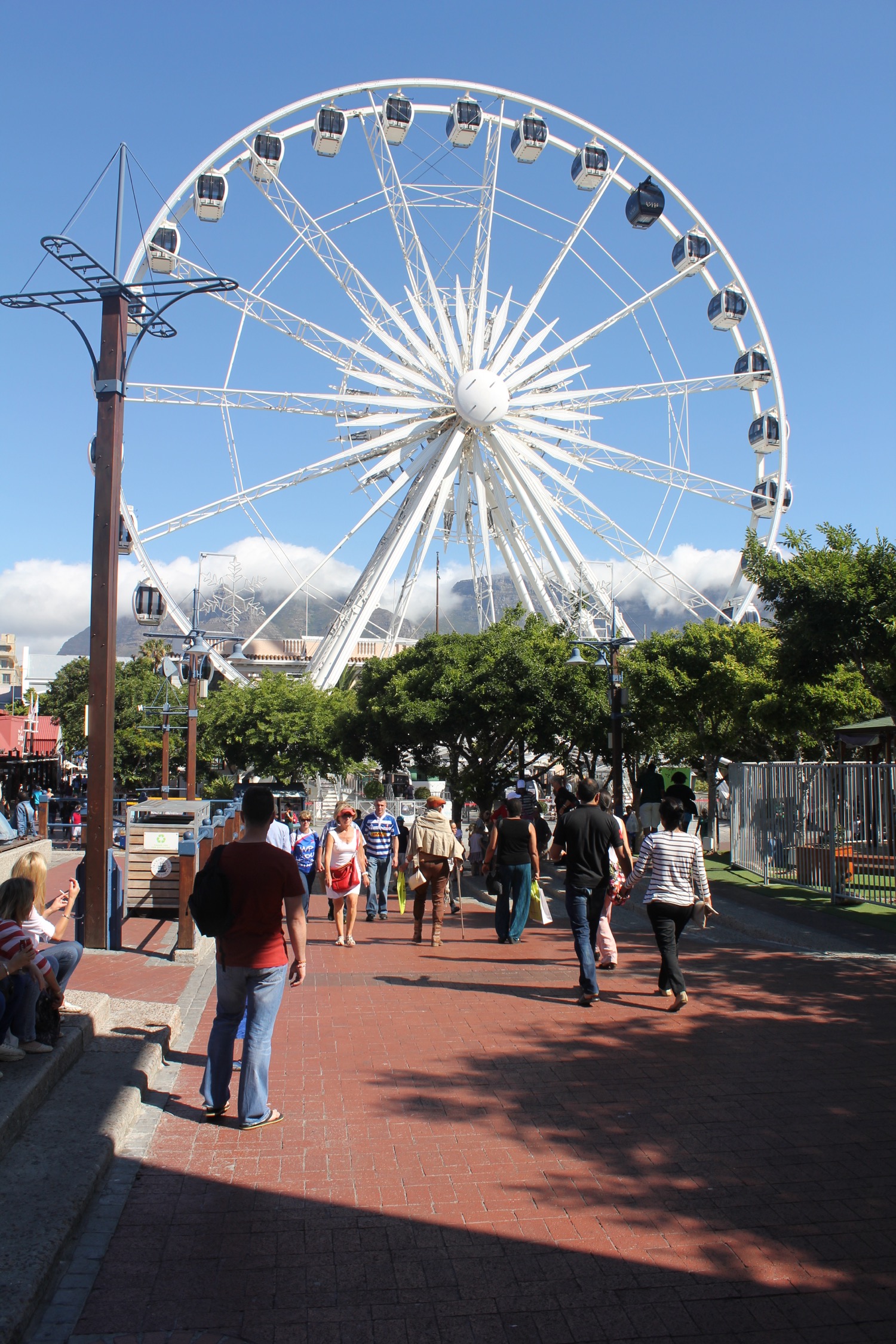
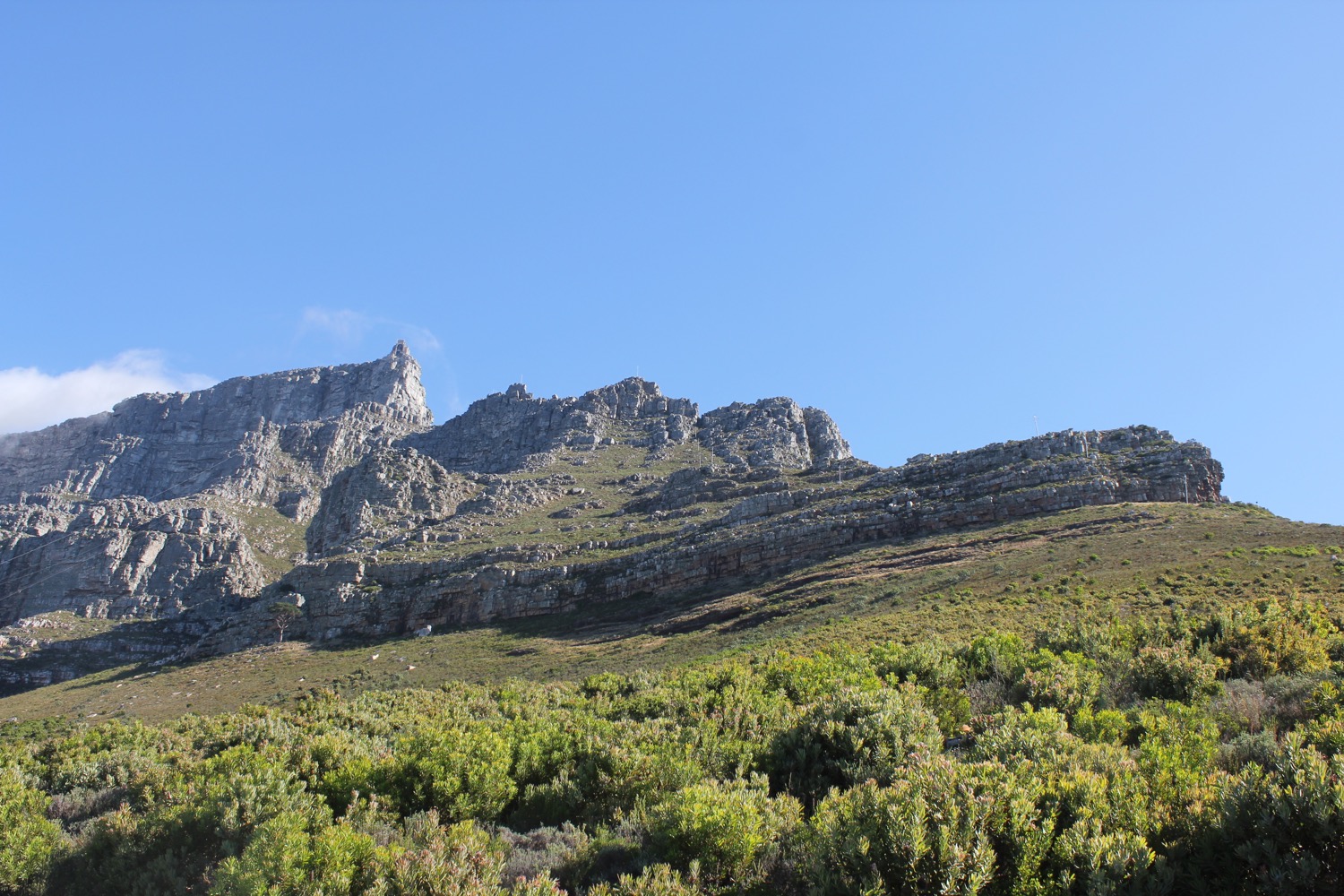
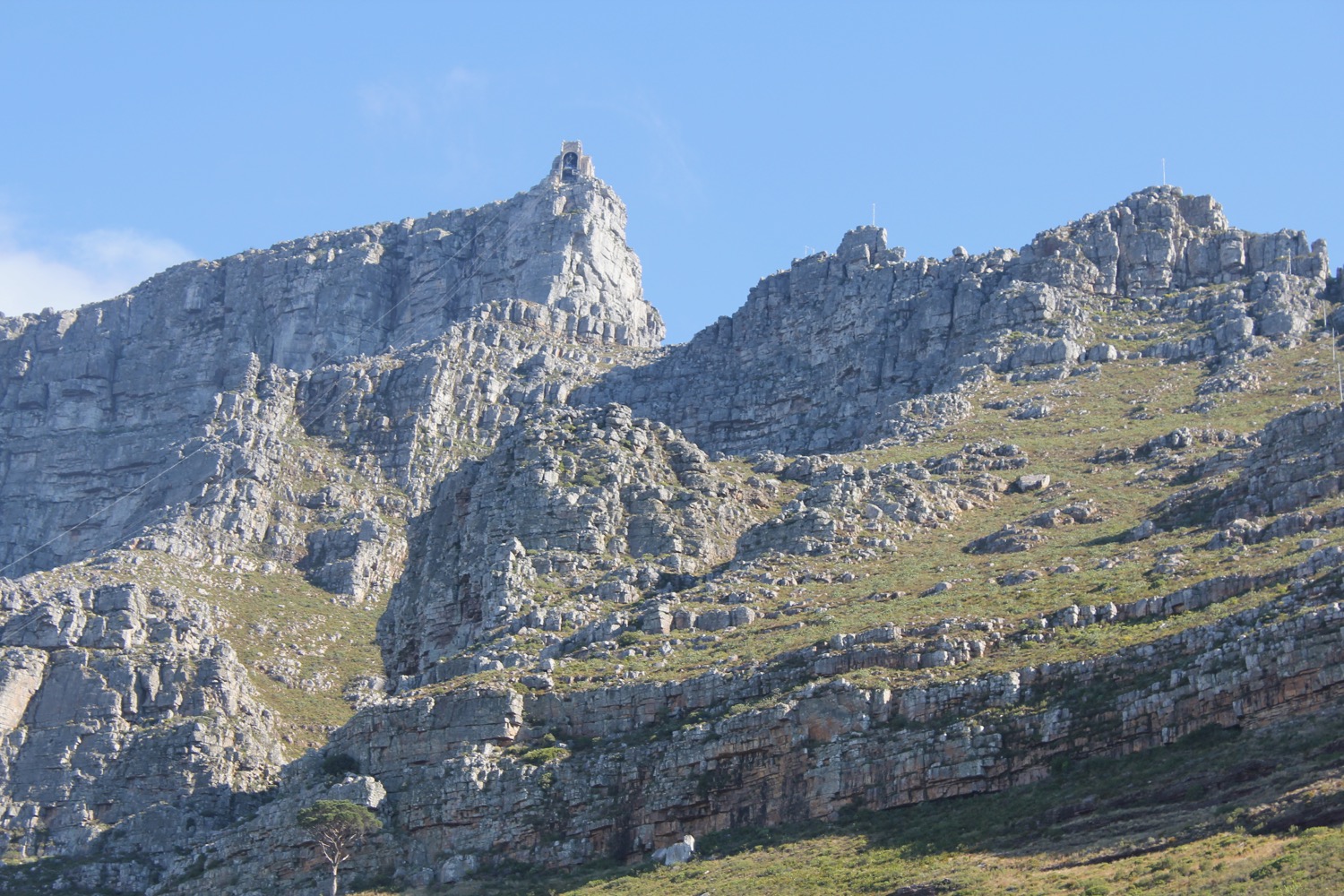
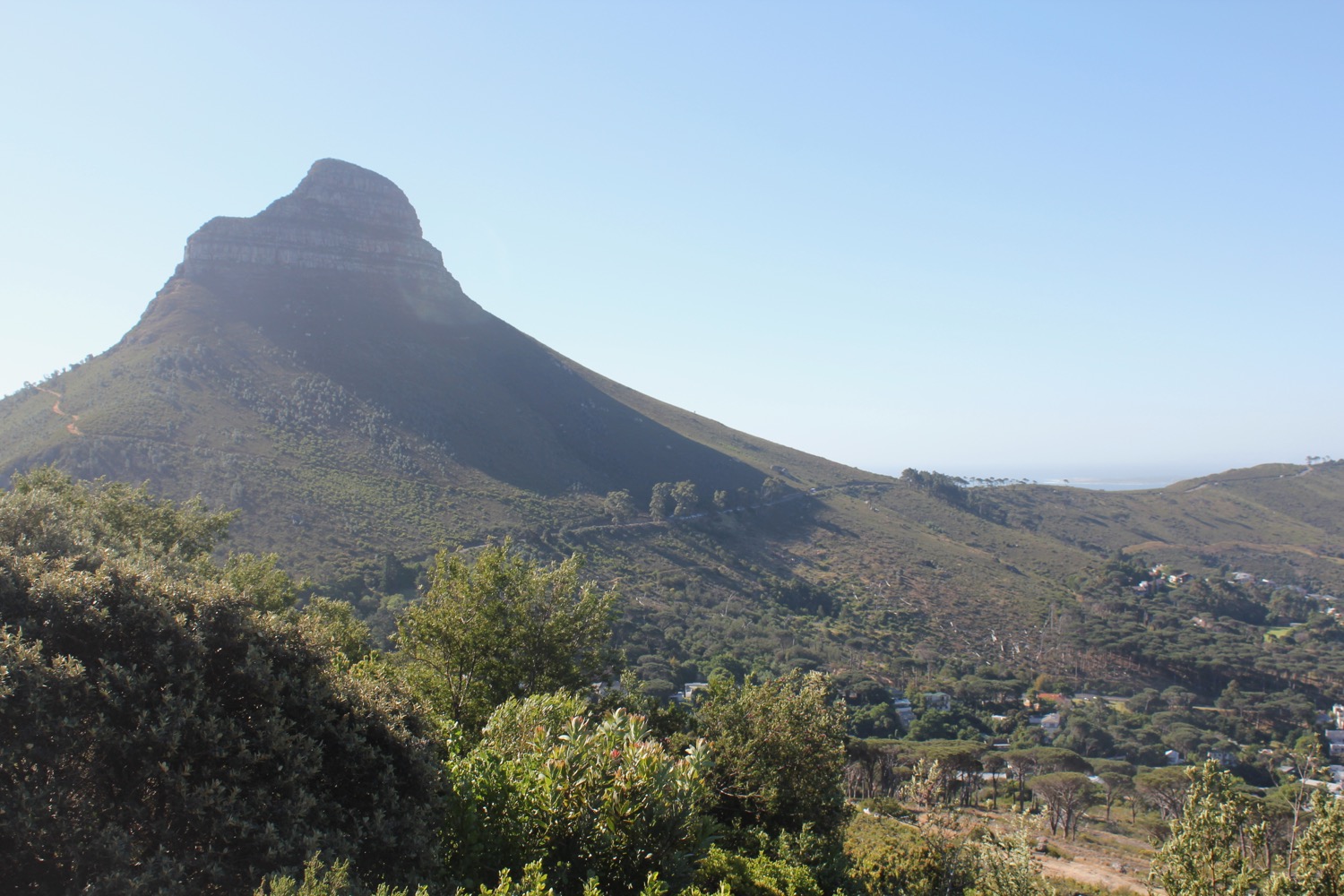
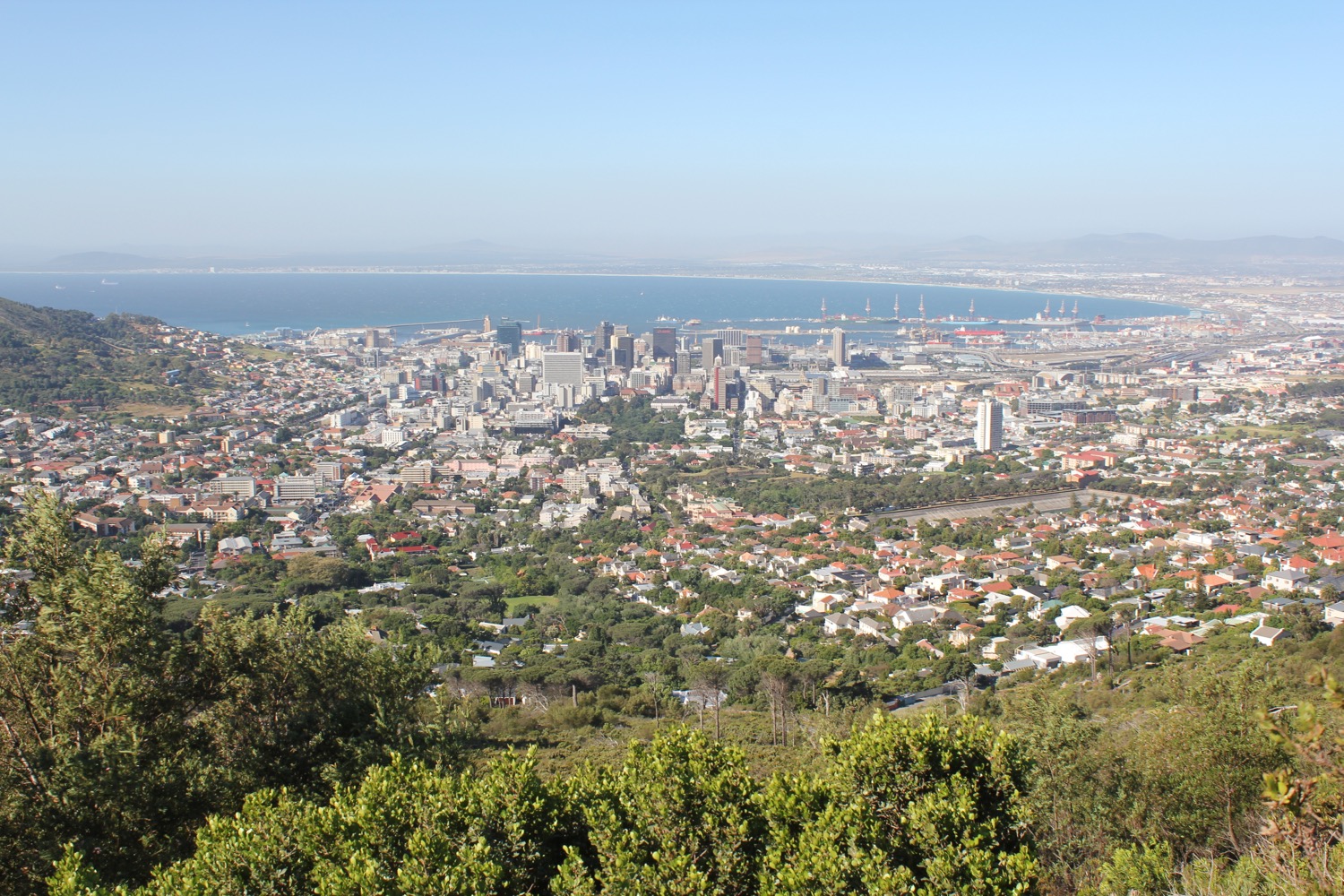
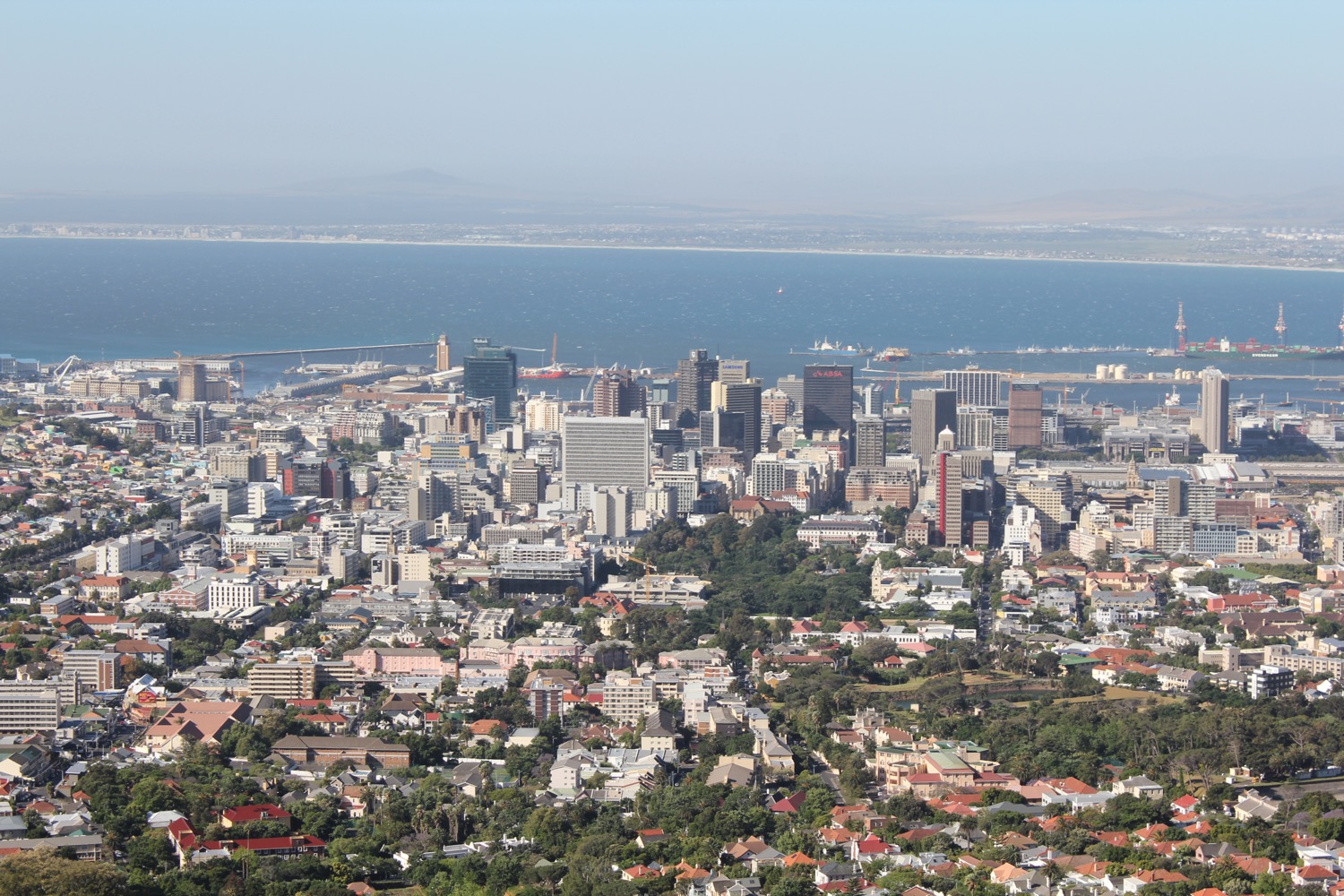
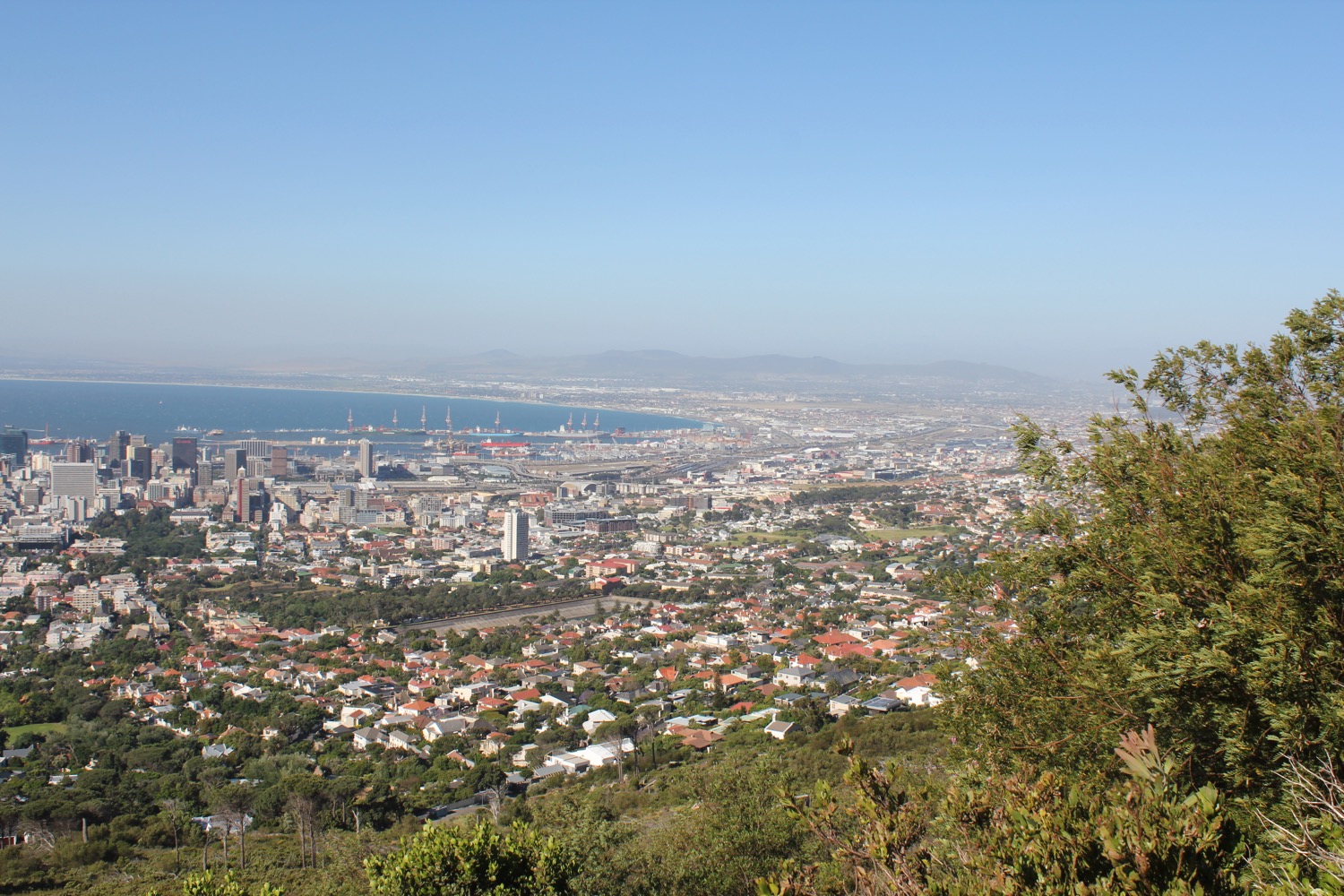
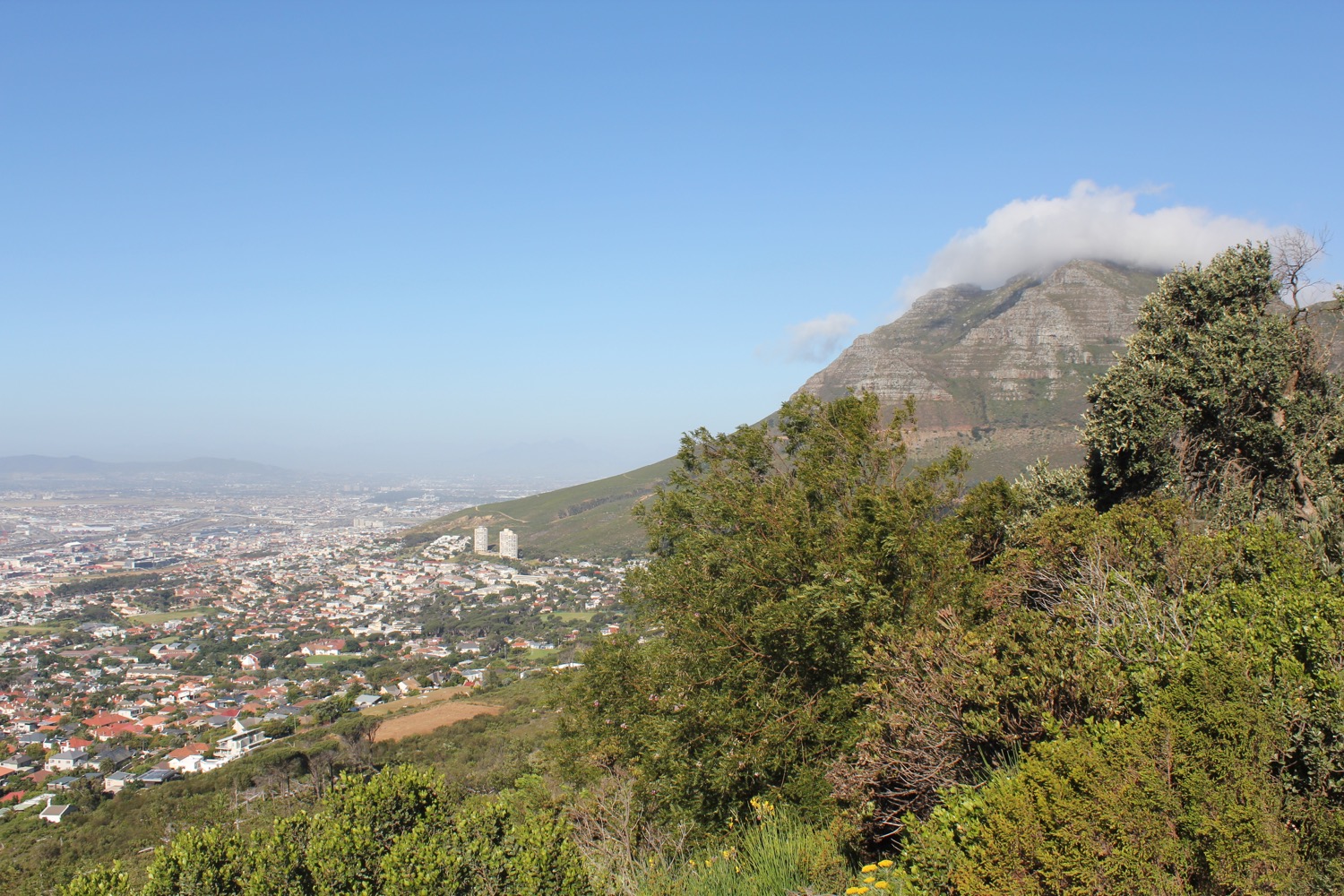
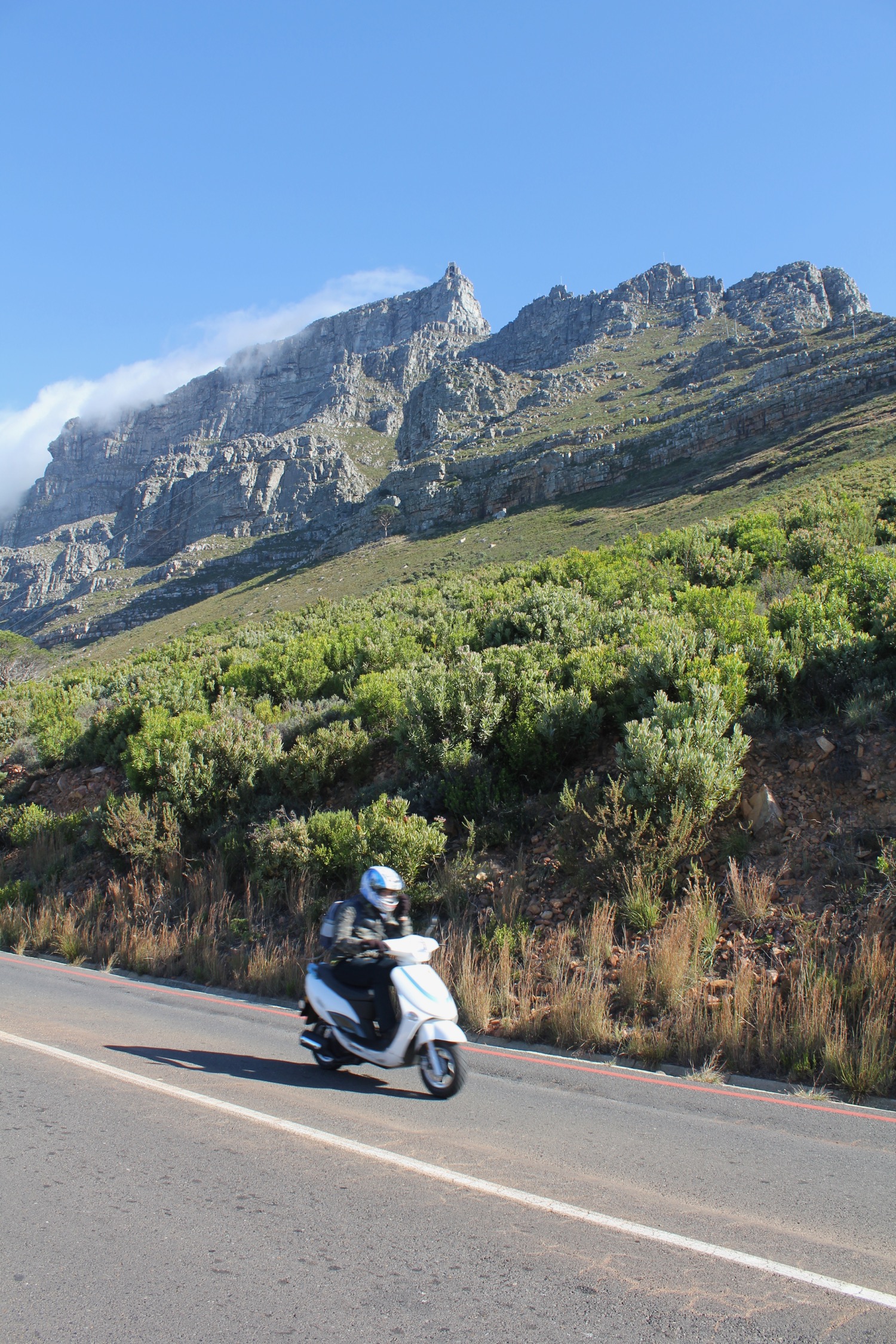
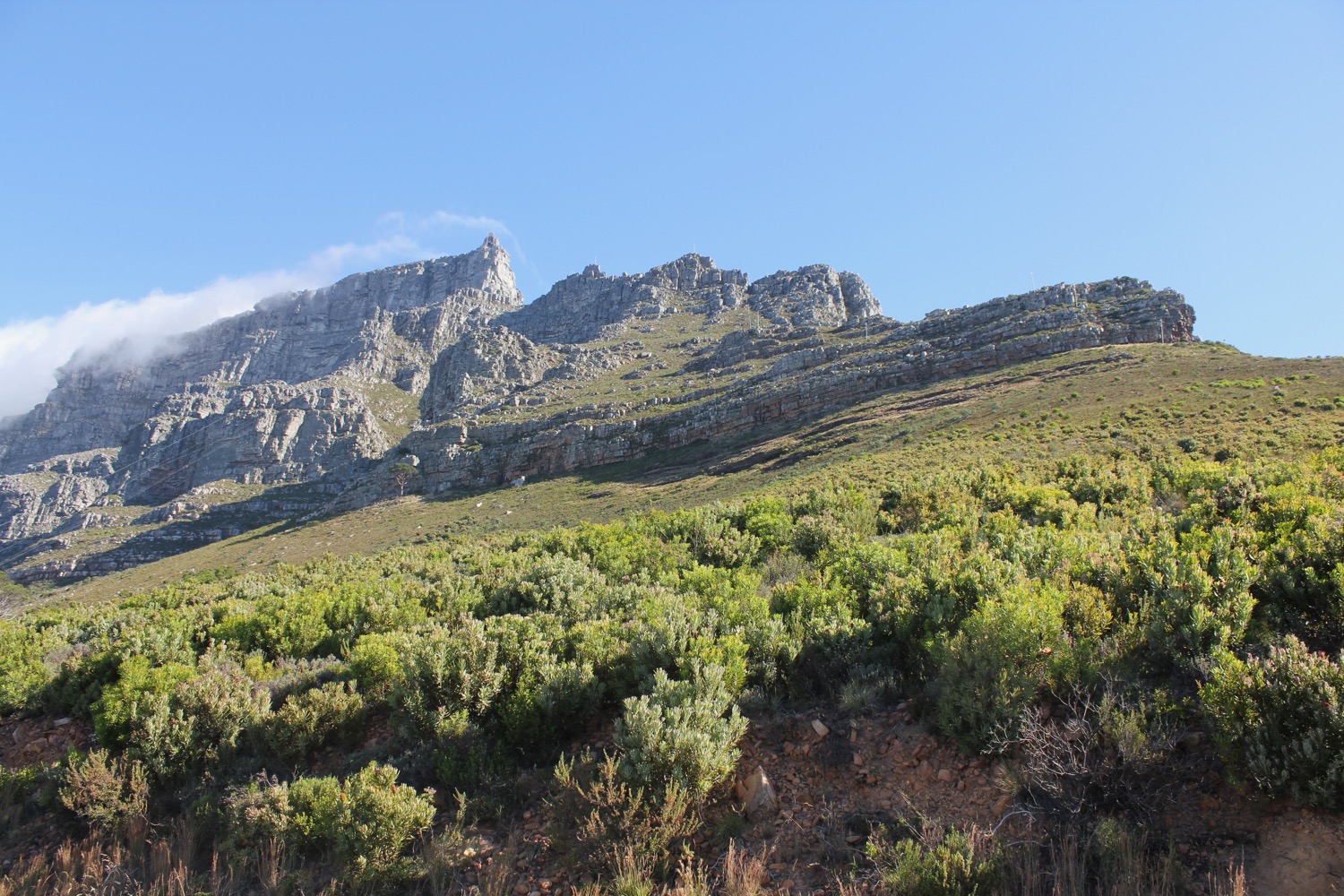
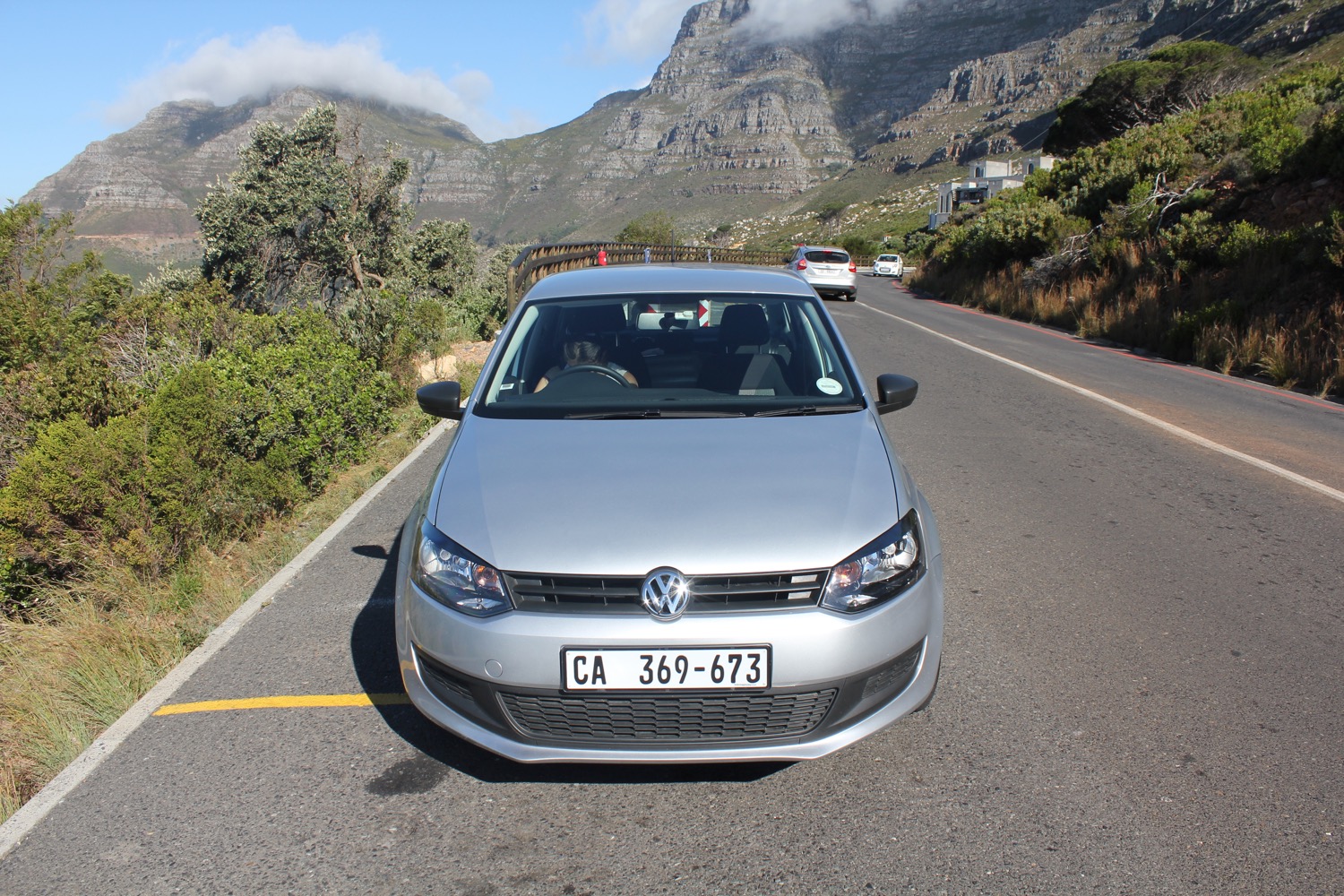
As we screamed down Highway 2 toward Somerset West, all of a sudden a boy ran across the road right in front of us. Not sure if it was a dare or a game or just the only way to get across, but my wife (who was driving) nearly hit him and had to slam on the breaks. I was reviewing pictures on the camera at the time, not even looking out the window, and was startled by what I saw.
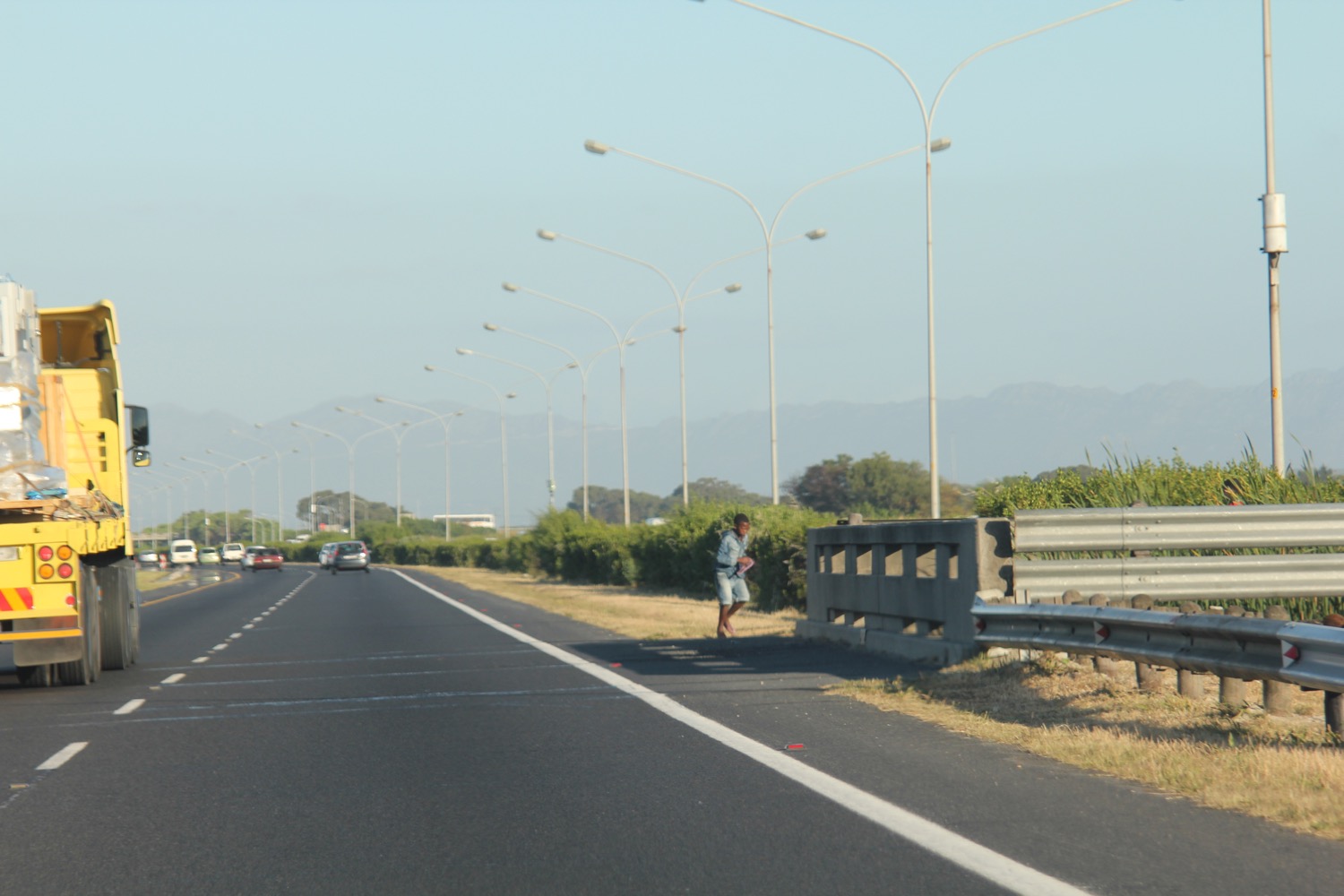
Not more than a few miles from majestic Table Mountain are the slums of Cape Town. A shantytown stretched for one mile on both sides of the highway, visible for everyone to see. Don’t think I have not seen poverty before in my journeys to 125 countries around the world: I’ve seen poverty in many parts of the world.
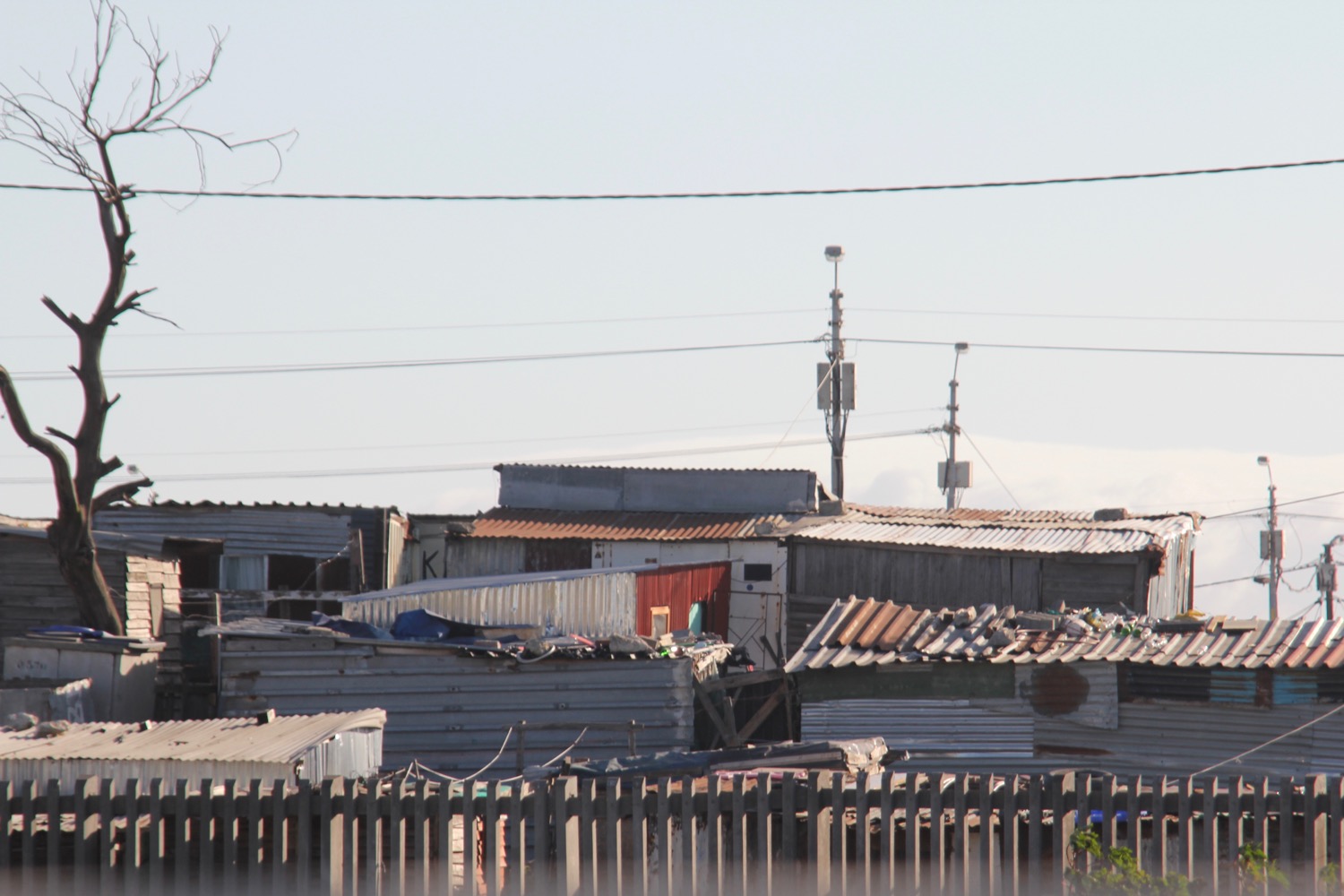

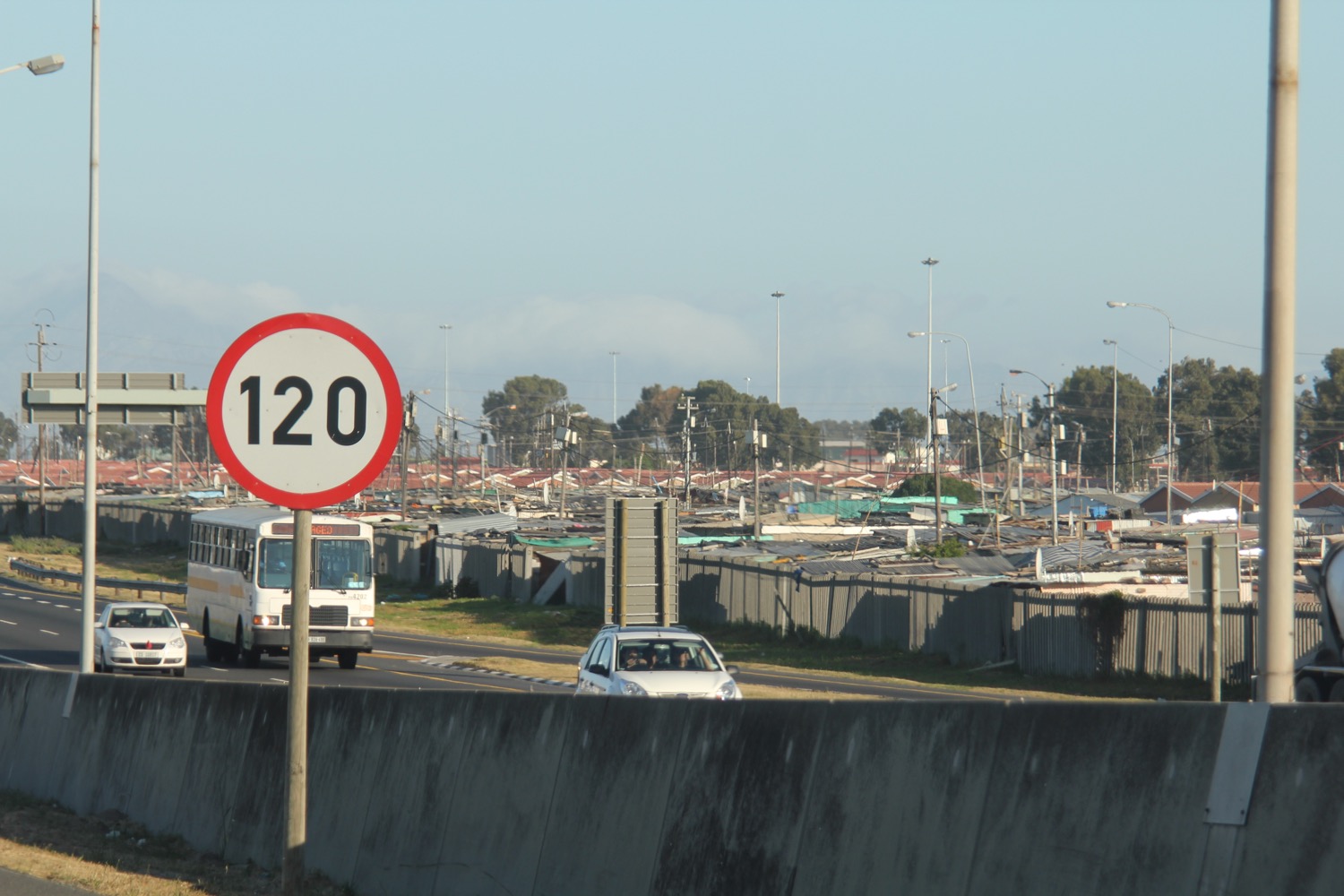
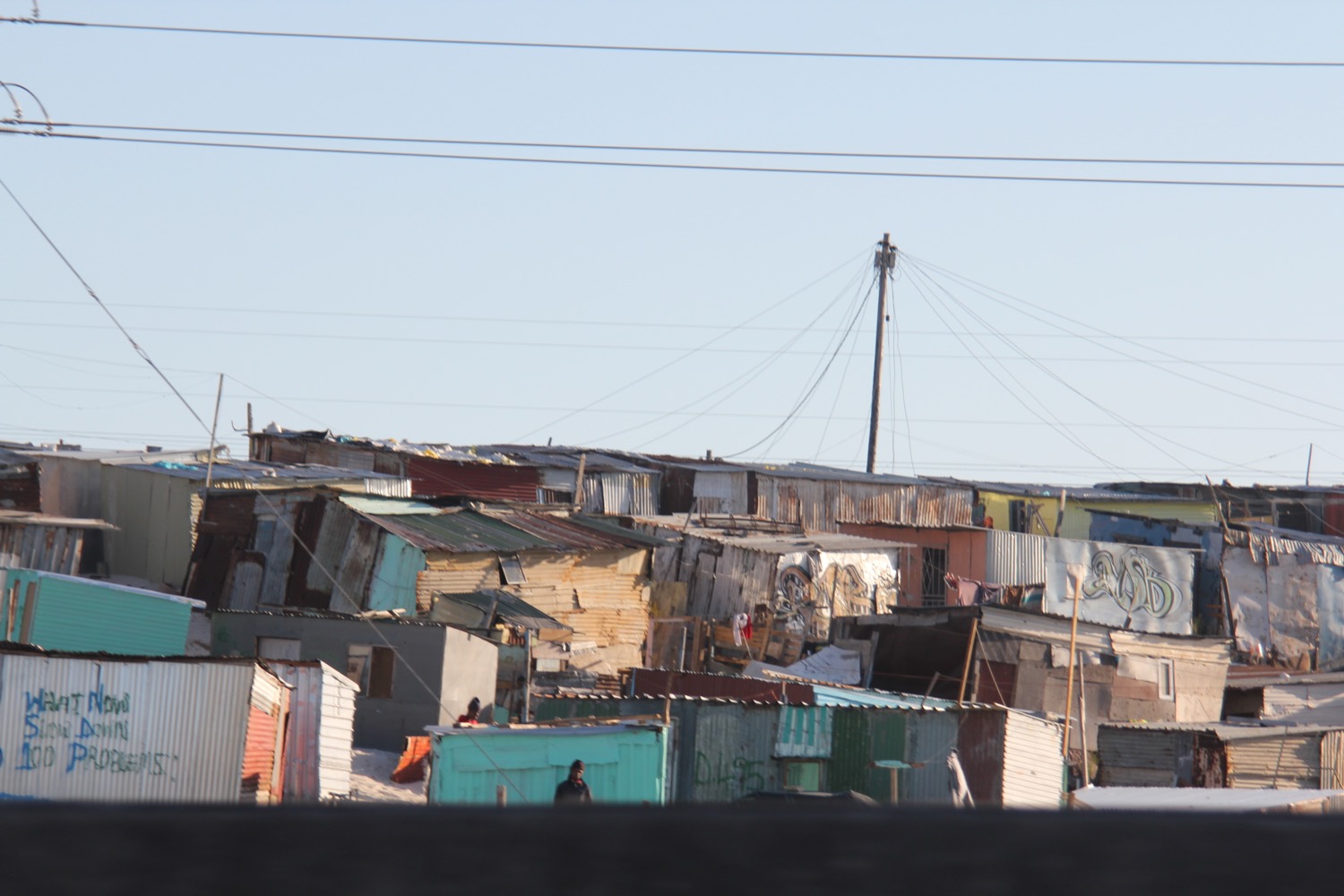
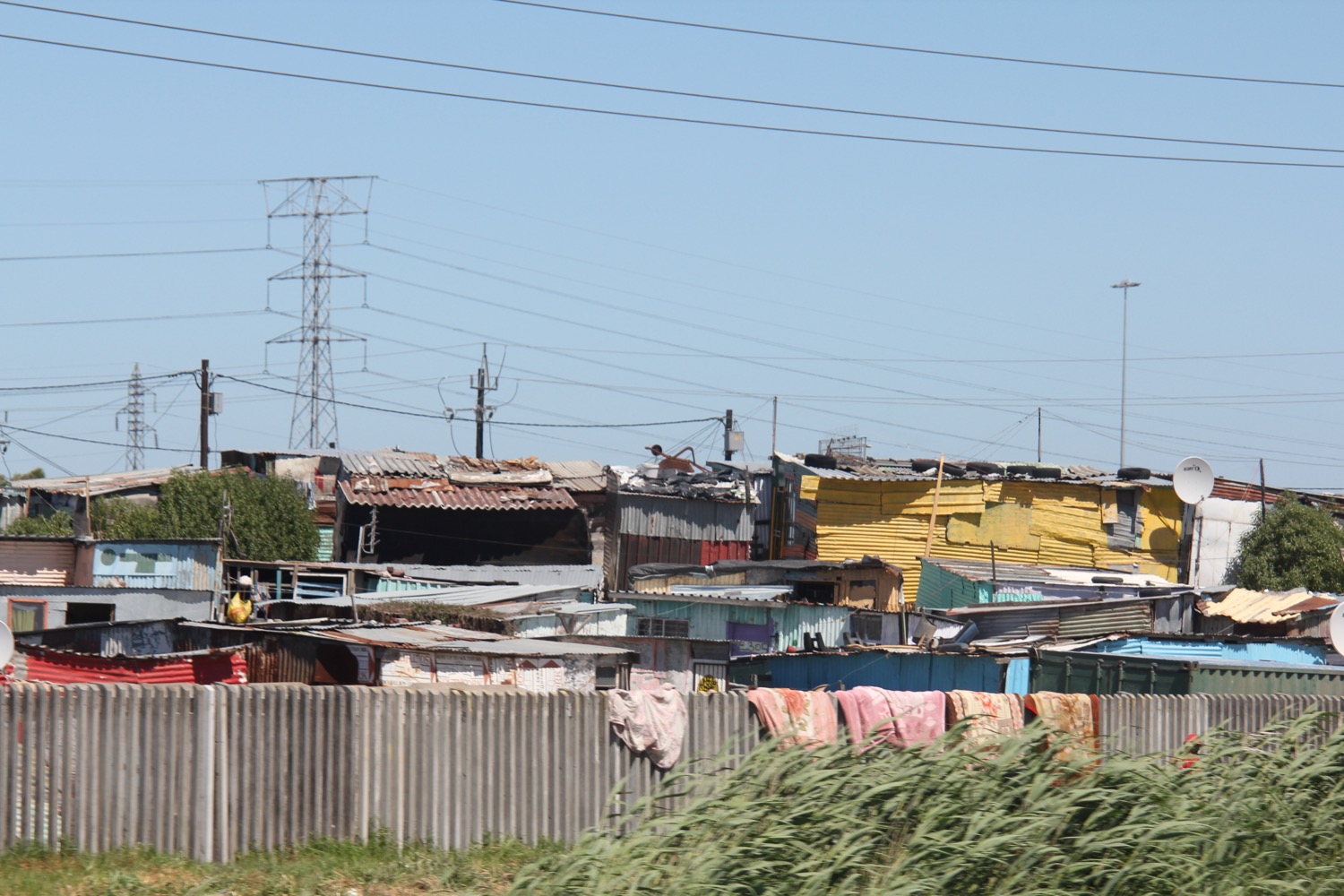
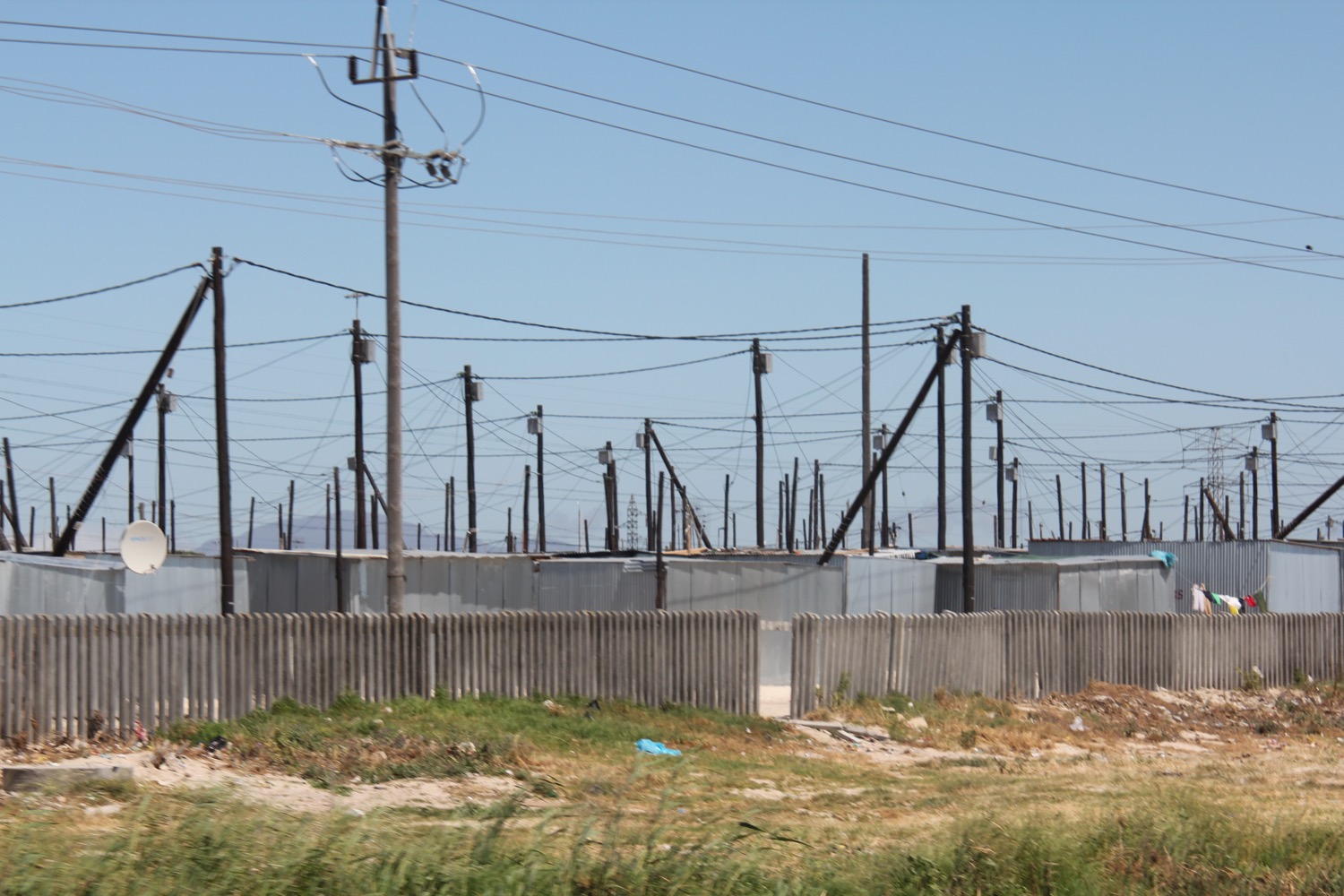
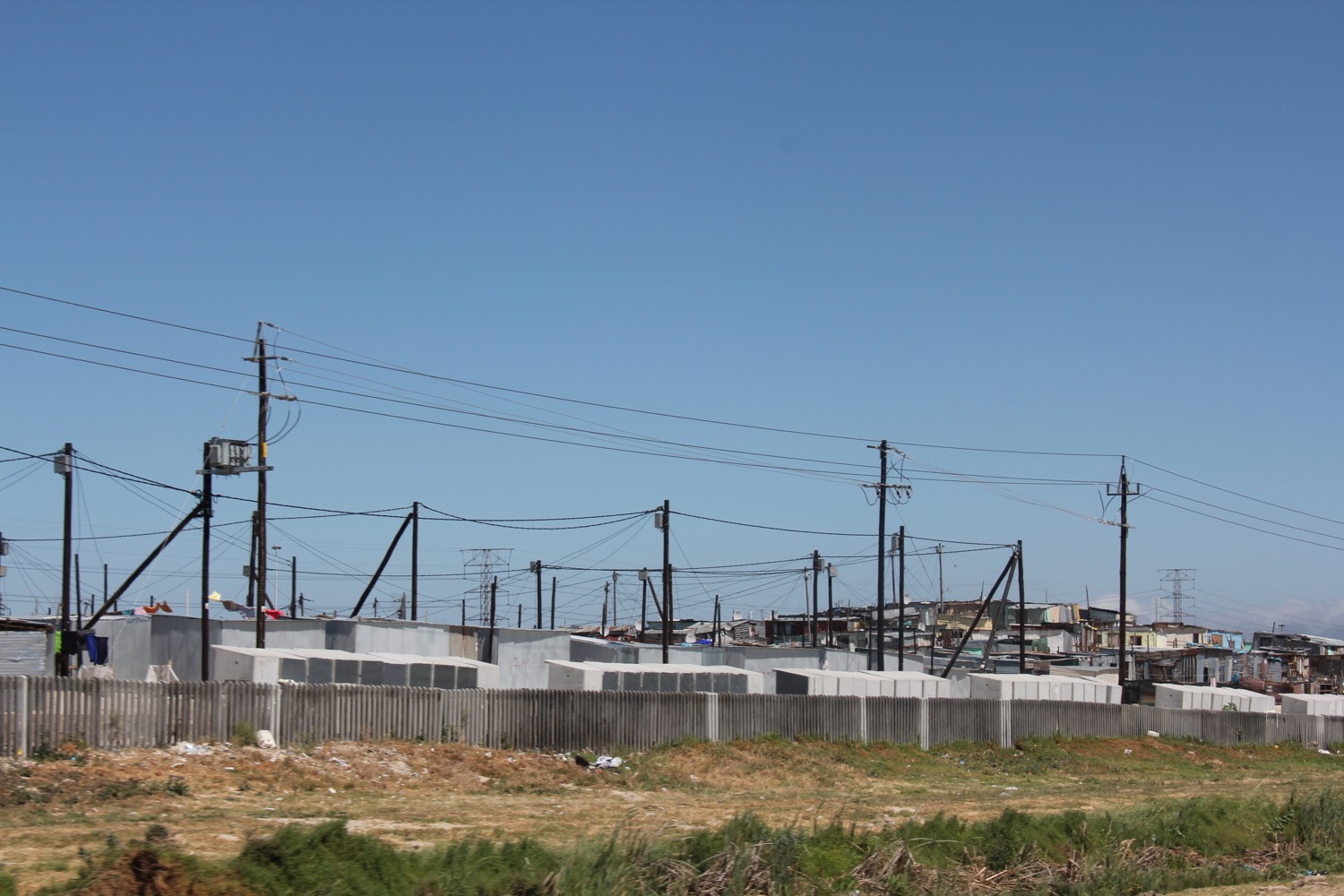
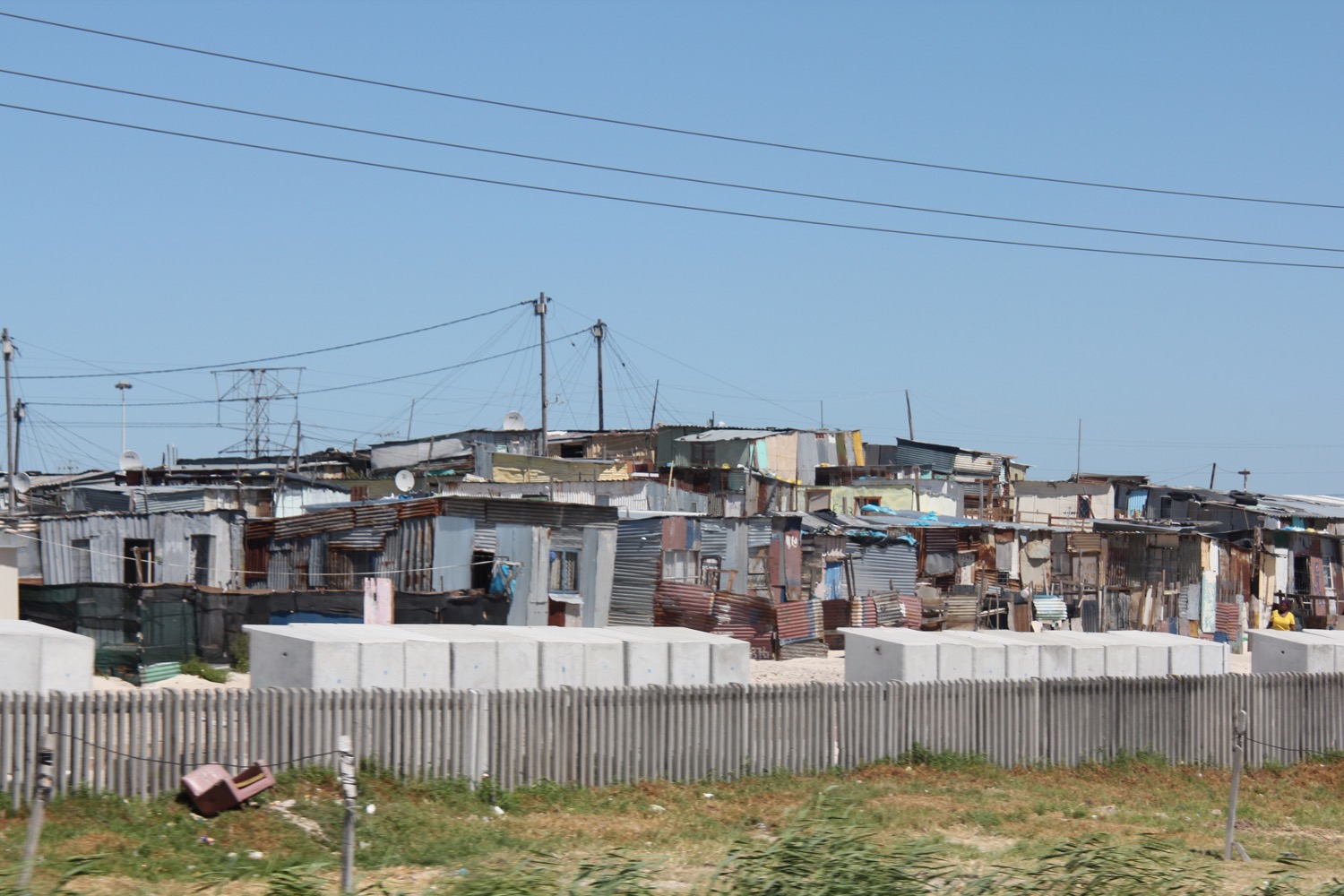
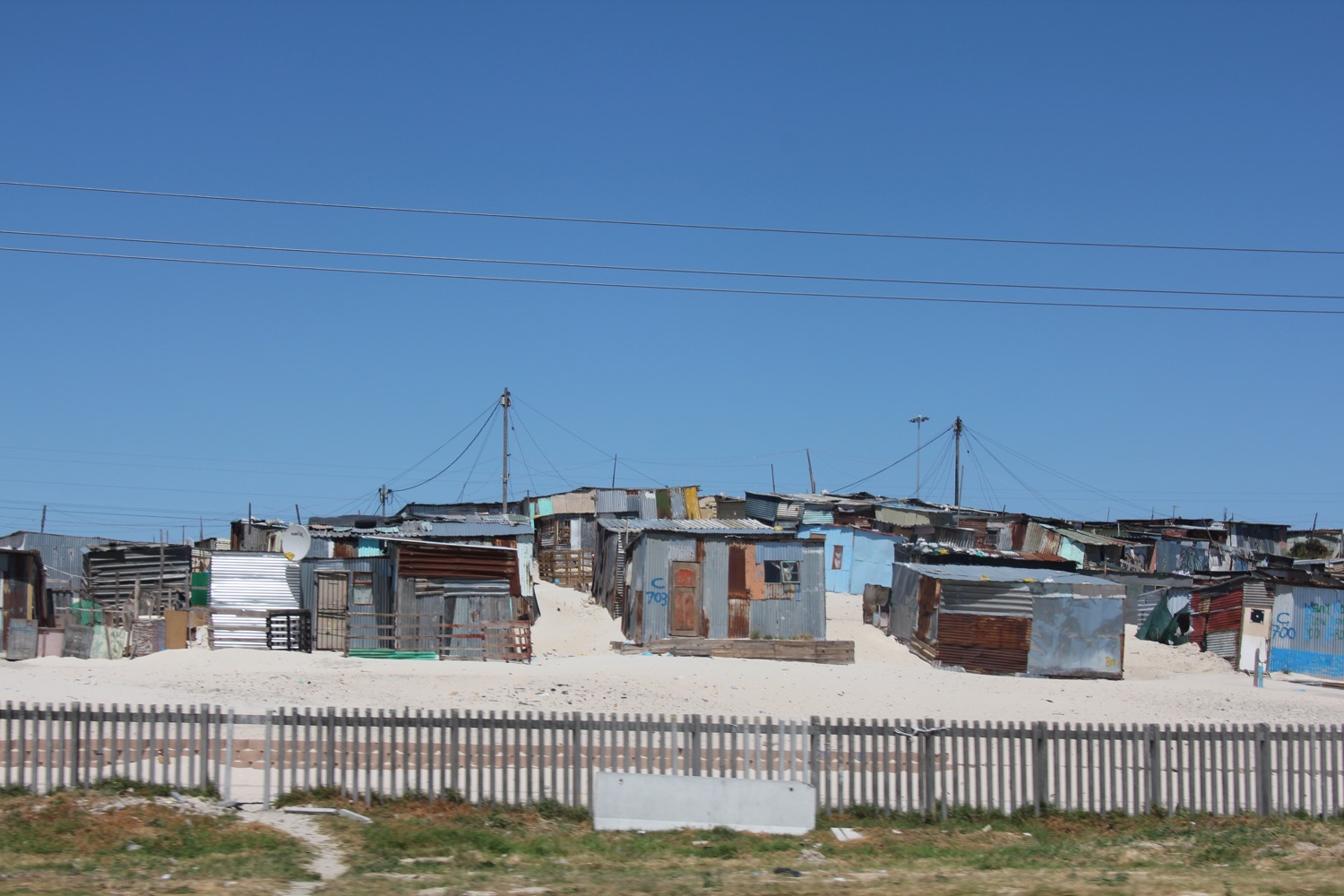
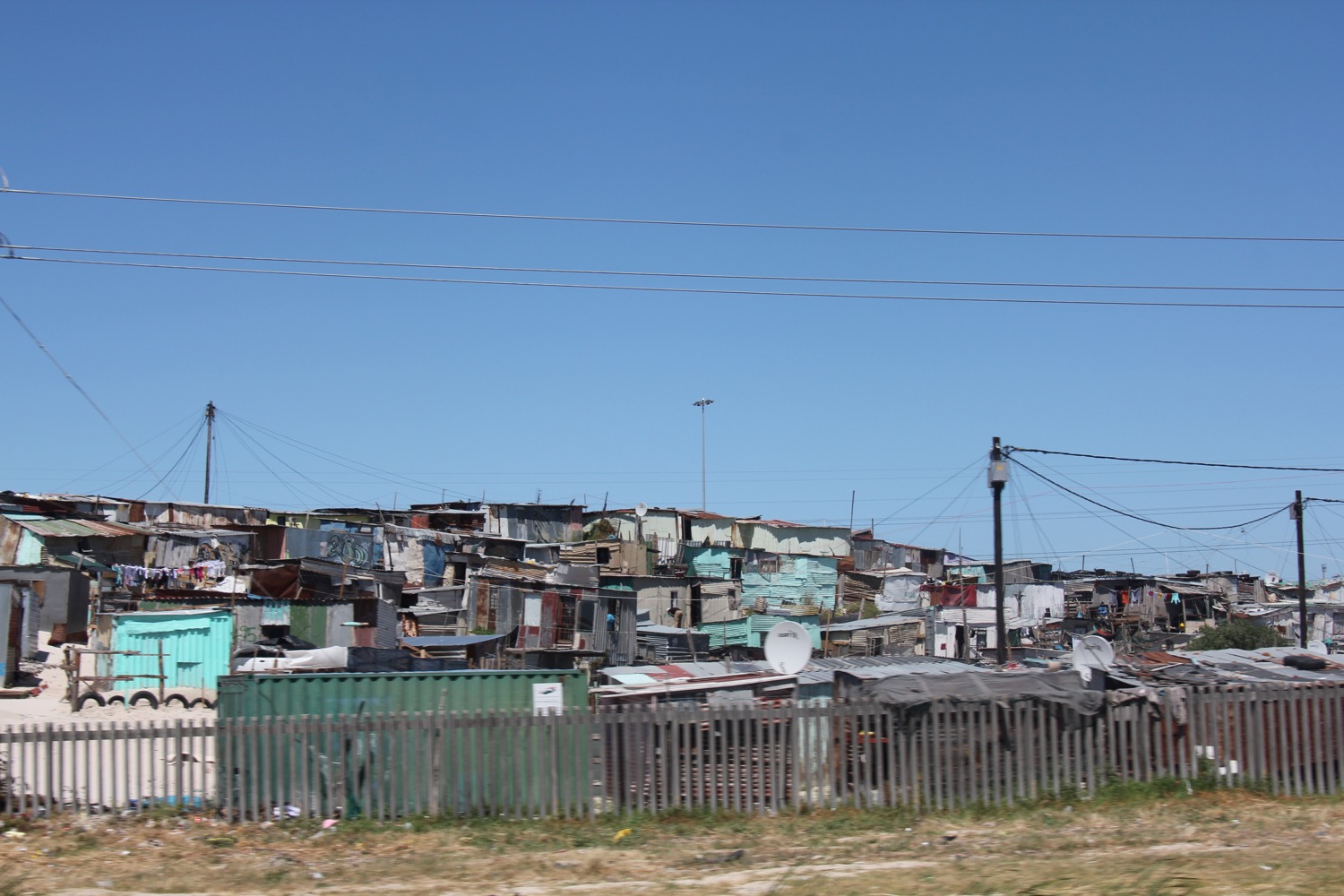
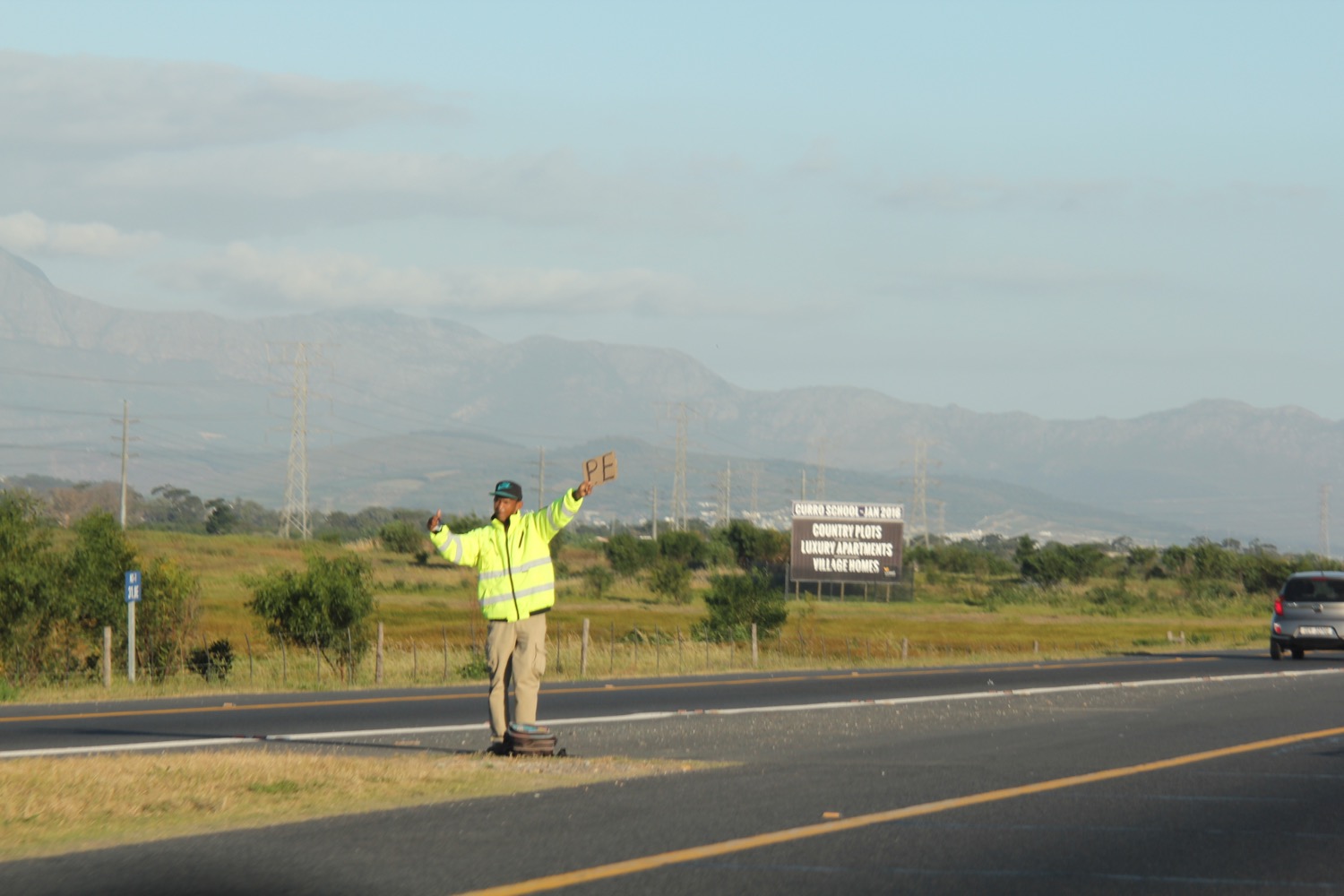
And yet there was something different about this poverty. Perhaps it was the juxtaposition between the two Cape Towns…so close together…something I never would have expected. I thought Cape Town was a rich city…I had no idea there were such shoddy areas. There were people out and about in the slums…all of them were black.
As we neared Somerset West, the landscape changed yet again.
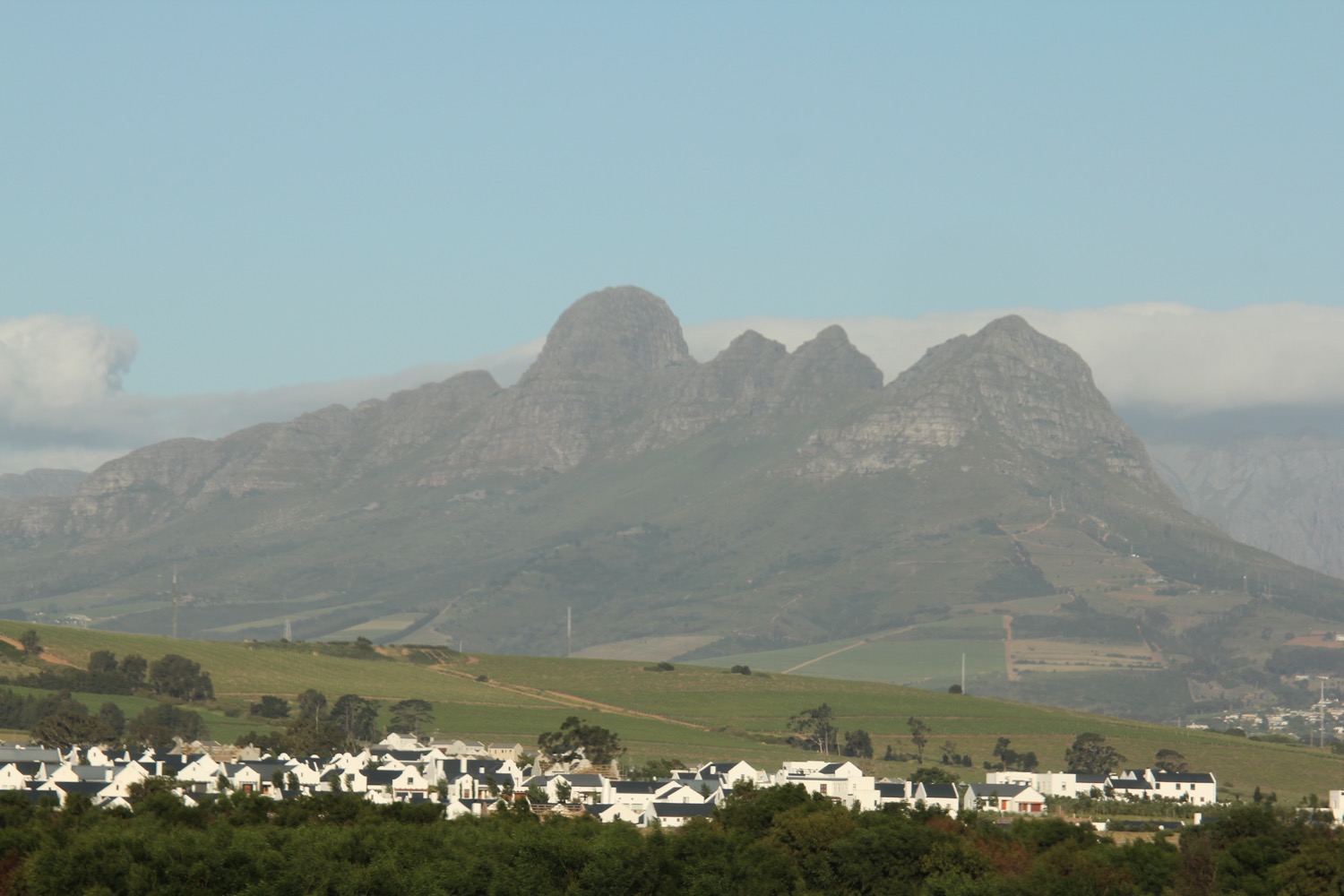
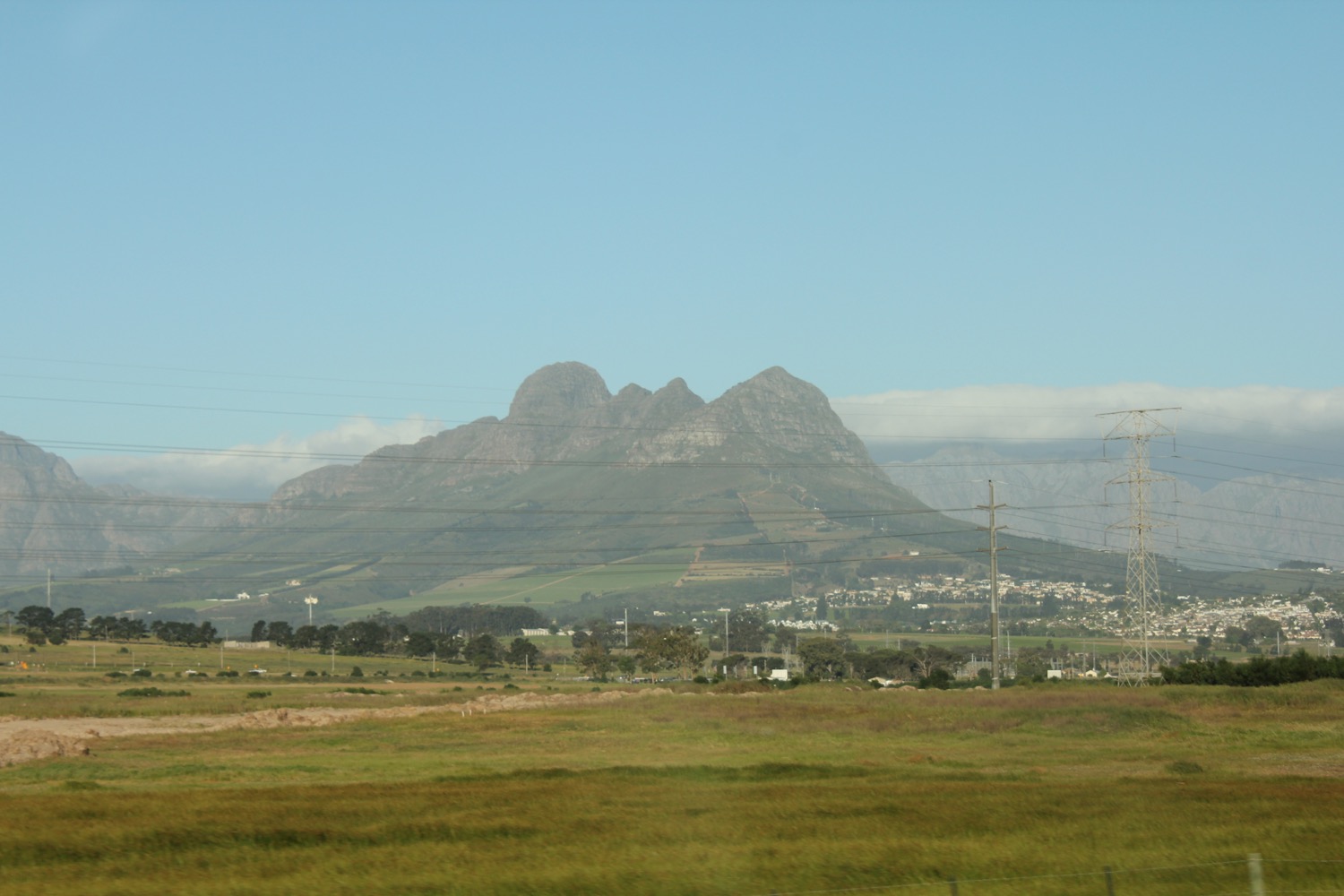
We stopped in a Shoprite to pick up groceries for dinner. As usual, there were black men roaming around the park lot, who served as “guards” and were also available to help guide you in and out of your parking spots or carry your groceries for a few Rand. Like the interaction between the French woman and the waiter in Mbabane, Swaziland, a white woman totally ignored the black man offering to help her carry her groceries to her car. She would not even look at him.
We got to our guest house and noticed that we were staying in a rather upscale neighborhood. The house had a gated entry and we noted security cameras festooned in the trees. As we pulled in and stepped out of the car, two barking dogs ran over to greet us and had to be restrained by the owner (one bit me the next day, though I think he was just a little friendly. I hate dogs…but I digress).
The Evening Run
It was now dusk and we wanted to go running. With balmy conditions and a beautiful sunset, it was a perfect time for a jog. Our hosts – a lovely German couple who got fed up with the corporate world in Hamburg and moved to Cape Town – recommended a route for us and said not to worry about safety because “it was still early.”
We ran for nearly an hour and made an observation as we jogged up and down residential streets in this cozy middle-class white suburb: every home had a high gate and every home had a dog. Every home. The barks were deafening and I could not help feeling just a bit sad that people felt the need for such security measures.
We would visit Robben Island the next day and observe the historical remnants of state-sanctioned apartheid, but the harmonious future of racial unity envisioned by Nelson Mandela is not a reality – not in Johannesburg, not in Pretoria, and especially not in Cape Town.
CONCLUSION
One month in Southern Africa is hardly enough time to understand the nuances of race and politics in a post-colonial atmosphere, but Cape Town made me sad – for though such income disparity is also a hallmark of my own hometown, I nevertheless have never seen such a divide so close together and such a blatant culture of fear and mistrust between two peoples separated only by the degree of melanin in their skin.
Read More of My Month in Africa Trip Report
Introduction: A Month in Africa
Review: Houston to Lagos in United Airlines 787 Business
Transit in Lagos: Bribing My Way Out
Review: Oasis Lounge Lagos (LOS)
Review: Gabfol Lounge Lagos (LOS)
Lagos to Johannesburg in South African Airways Economy Class
Setting Up Shop in Pretoria
How to Obtain a South African Police Report
A Safari in Kruger National Park
Review: Nkambeni Safari Camp
Driving Through Swaziland
Review: Mountain Inn Mbabane, Swaziland
Review: Johannesburg to Livingstone, Zambia in British Airways Comair Economy Class
Our Humble Abode in Zambia
Victoria Falls from the Zambian Side
From Hate to Great: Victoria Falls, Zimbabwe
The Old House Guest Lodge – Kasane, Botswana
A Visit to Impalila Island, Namibia
Kasane, Botswana to Johannesburg on South African Airways (Airlink)
Review: Hyatt Regency Johannesburg (Suite)
Road Trip from Johannesburg to Lesotho
Review: South African Airways Domestic Voyager Lounge – JNB
Get Daily Updates
Join our mailing list for a daily summary of posts! We never sell your info.

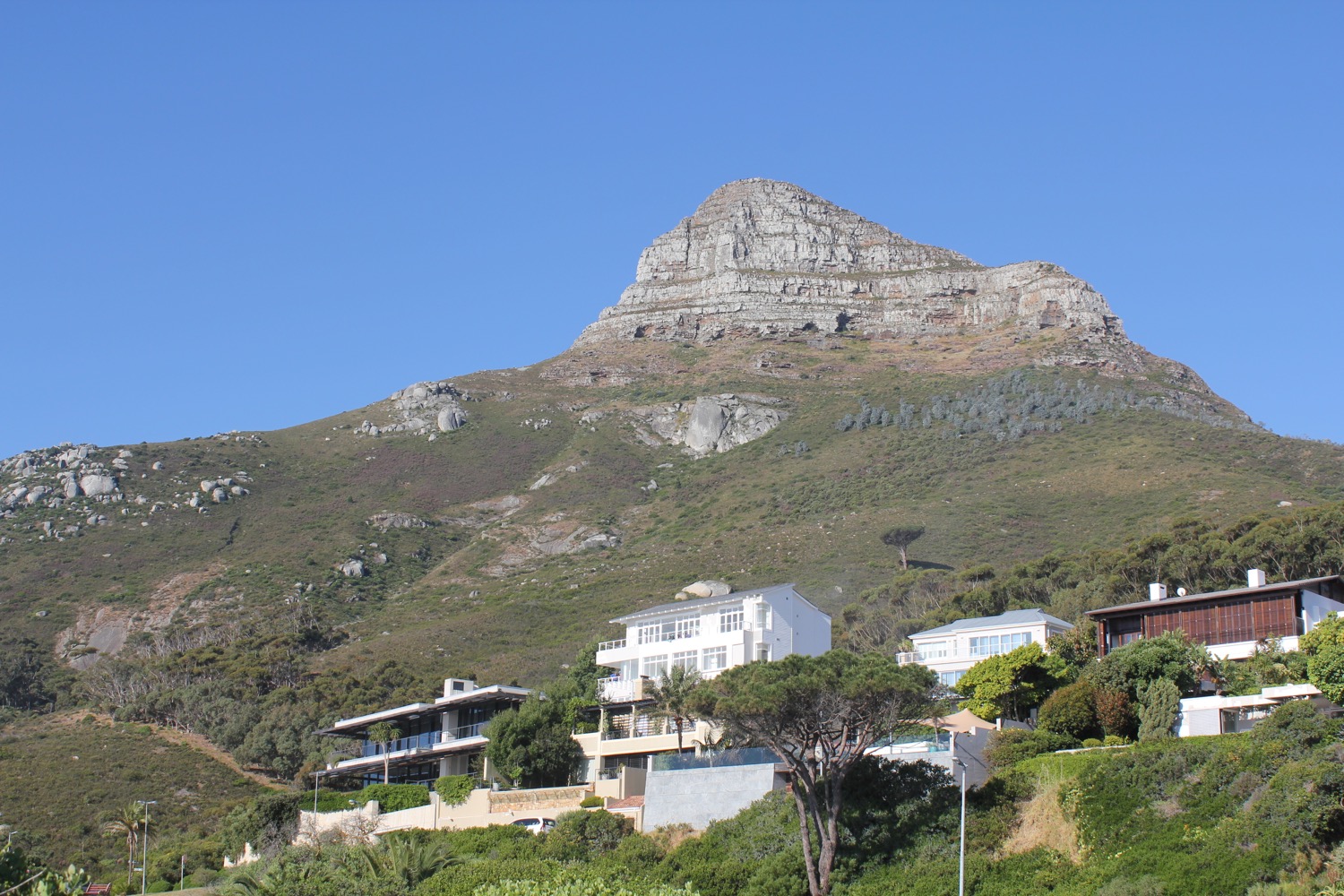
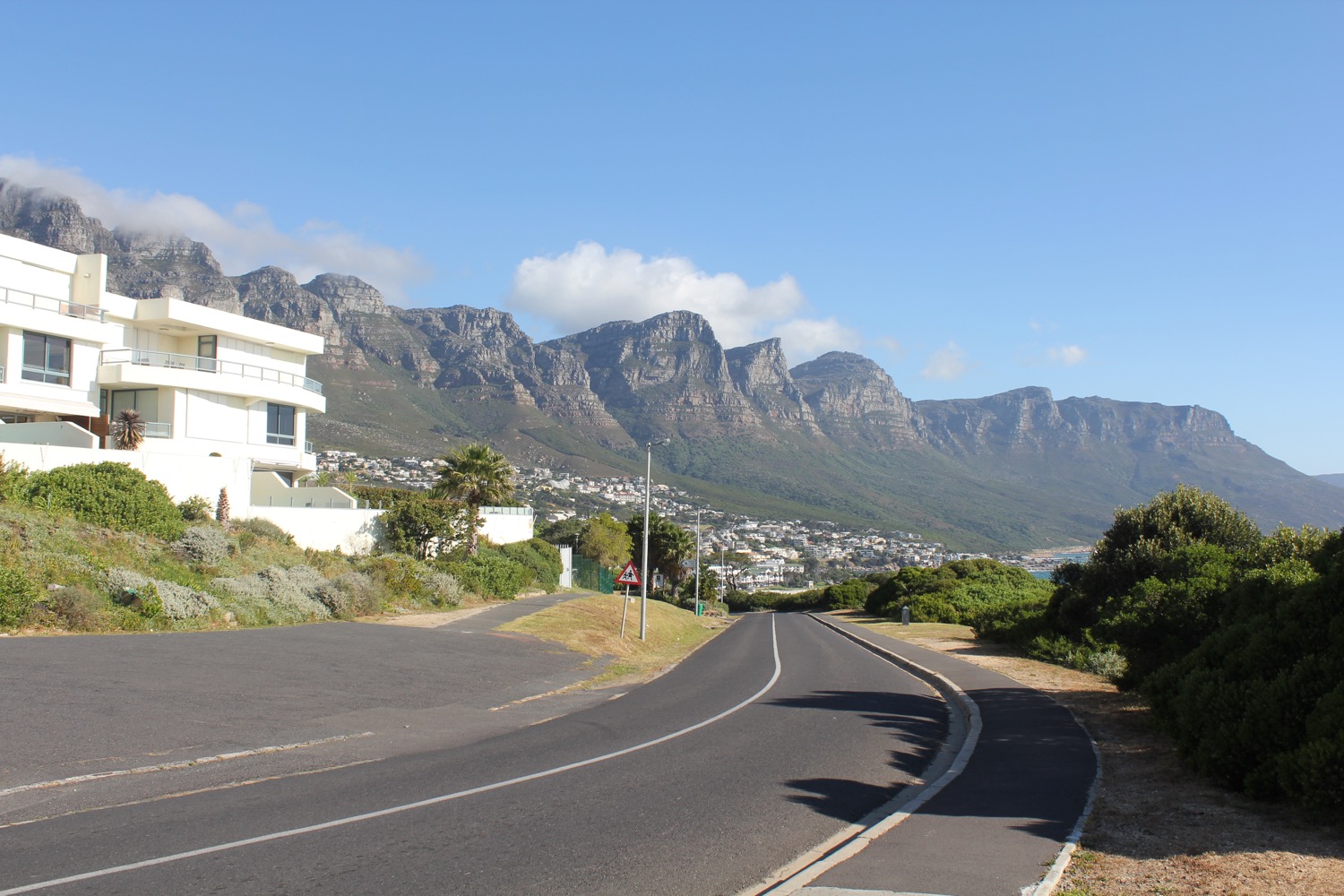

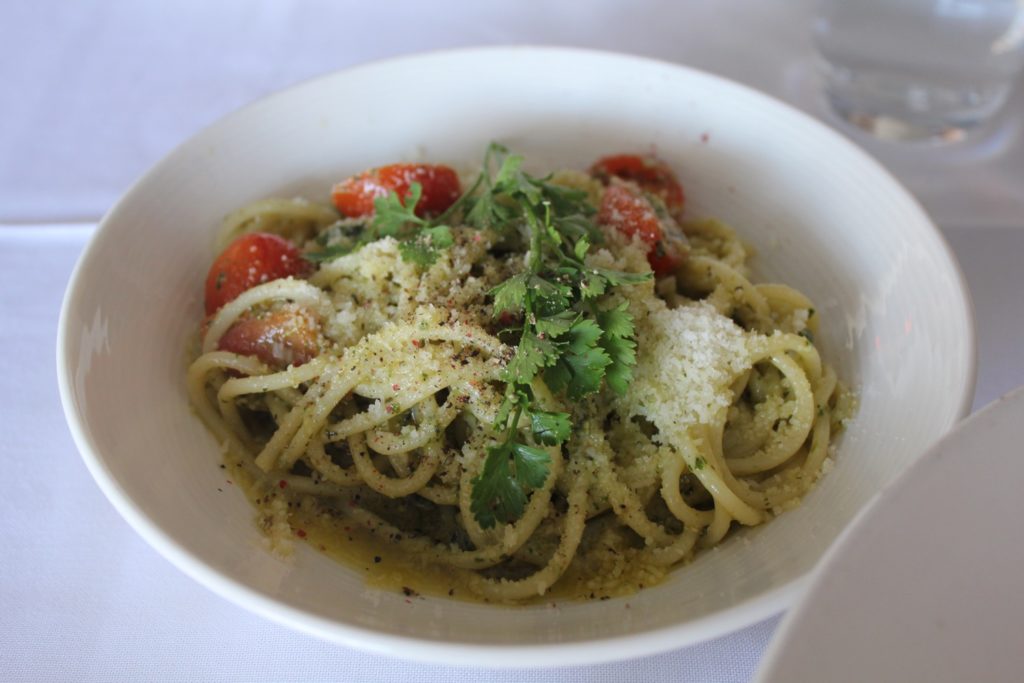


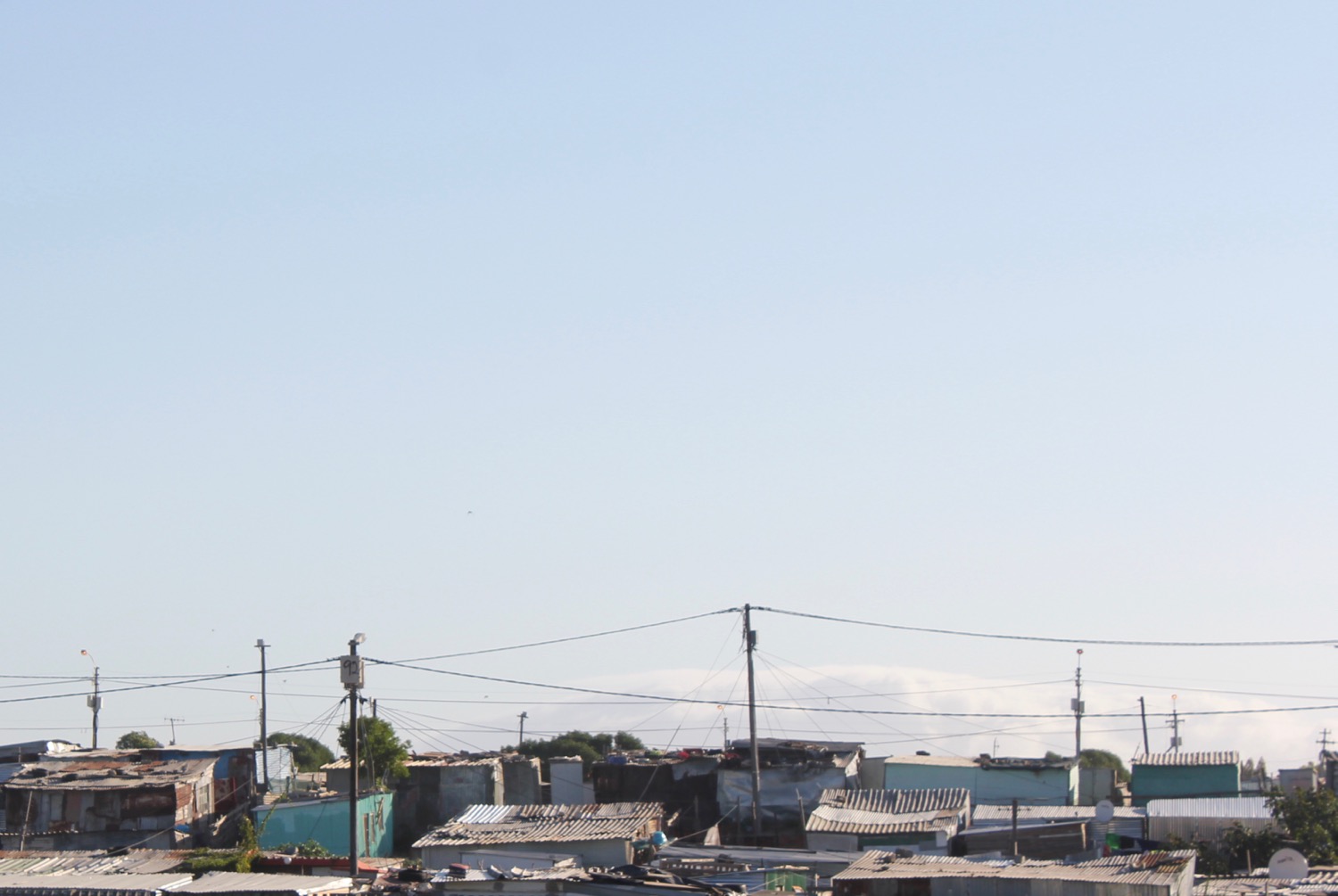
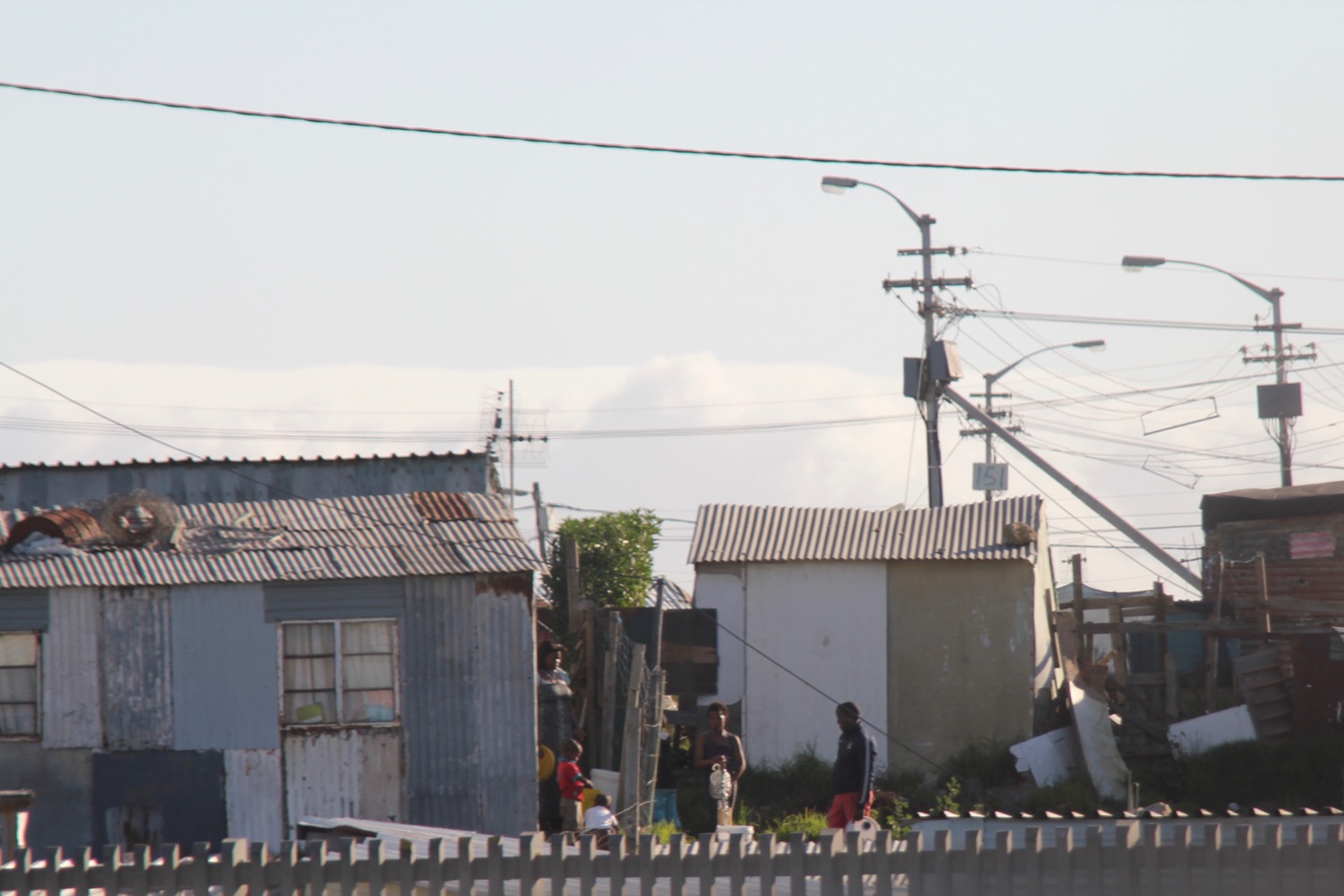

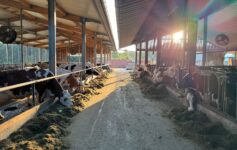
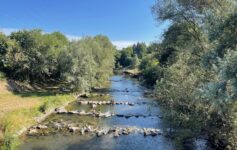
Perhaps not in Los Angeles, but here in the Rust Belt you sometimes get that kinda feel.
Agree the racial and wealth disparities are still very real in South Africa. The country is nevertheless spectacular and well worth a visit. Since you stayed in Somerset West I hope you made it to Vergelegen winery, the most (visually) spectacular winery I have ever visited.
Somerset West is beautiful and I hope to take my son to South Africa for a multi-week trip. I love South Africa. Due to the police clearance certificate issue, we had only one night…which made the drive to Somerset West all the more annoying…and spent the next day on Robben Island before flying to London.
The shanty place you drove by on your way to Cape Town is my home. We call it New Rest because even though you see it like that it’s better than the conditions we were staying in before. No electricity, no sewage system, no running water. And the City of Cape Town refused to bring those services. We literally had to protest for months for them to install those services.
Right now I’m not working and constantly thinking of what I’ll eat next. A few years I started college and a company I was working for helped me with funding my education provided that, after graduation, I’d spend the same amount of years working for them. I didn’t have a problem with that as it was a win-win situation for both parties. Unfortunately it went bankrupt and was dissolved in my 2nd year of studies. And now I don’t get any kind of support to further my education. Which is the only hope I have of getting out of this situation.
It kinda pisses me off when people come over to SA and start judging what they don’t really understand. Why do people living a first world lifestyle in South Africa get judged but people living in the US don’t? Owning a million dollar house and driving a BMW is somehow worse to do in South Africa than the United States or Europe? Guess what those poor people still exist maybe just not in your backyard. And they benefitted from the same institutional advantages as wealthy South Africans.
I find the institutional racism and disparities in the US are far more entrenched than in South Africa at this point where active steps are at least being taken to address the past. Also everything has to be addressed in PC terms otherwise you start getting weird looks…
The interesting thing to me was the open disdain I saw for many black people while visiting. You’re right, that undercurrent is very much alive in the USA too, yet it is somehow not so blatant. At one guesthouse, the owner stated “this country is going to hell” and wished the Apartheid government would return. I don’t even know that she was racist: the country is falling apart under ANC leadership. But the shanty town juxtaposed to the beautiful homes on Table Mountain was very eye-opening for me. The high fences and dogs too. The fact that most towns are still segregated.
I don’t begrudge anyone for living in a luxurious home and driving a BMW. I just wonder what can realistically be done to bridge the great income gap–and great social gap–that lingers on in South Africa. Don’t think I am singling out South Africa, but it does give me pause that even when I was a child institutional racism was enshrined into law, decades after most other western democracies had abandoned it.
Yeah there is some resentment from lower middle class white South africans who lost their government jobs when Apartheid ended. These people have much the same attitude as those who voted for Trump here. I wonder what the attitude would be in the US if large scale social upliftment/affirmative action programs were instituted.
And what is “the attitude” people who voted for Trump have?
Many of the shantytowns around Cape Town are inhabited by illegal immigrants, called “foreigners” by the locals, who are hired as very cheap labor by everyone, black and white alike, in the Cape. They are also a source of friction with poor local citizens who feel these immigrants are stealing their jobs. The Government won’t do anything to properly house these people because then their presence would become permanent (it actually already is) or try to deport them because their cheap labor is so important to the local economy. The shantytowns have actually grown larger since Apartheid days as border controls have grown more lax.
Fascinating. Where are these immigrants coming from?
During Apartheid days they came from the so-called “Homelands” (e.g., tribal reservations). Now they come from Zimbabwe, Zambia, Angola, etc. Basically, the rest of Africa. The riots against “foreigners” that have been in the news the past couple of years have been about these immigrants, not against ex-pat or tourist types.
JetAway is lying or doesn’t know what he’s talking about. I am a black South African who was born here and I live in this shanty town. All these shacks, as we call them here, are inhabited by Black South Africans. Some of them were kicked out by landlords because they couldn’t pay rent anymore. Some come from their homes to stay with their kids as the families increase a d the house can’t accommodate everyone anymore. Some come from different provinces to search for greener pastures, which now seems like chasing a mirage. It is said that our economy is controlled by a White minority that care less about Black interests. That is why now there is too much talk about appropriating land and resources without compensation so that every thing can be shared equally to all South Africans
I too detected an undercurrent of – I don’t know, bitterness? – in the white South Africans I met. But I don’t think it was rooted in racism so much as the failure of the government, and the feeling that their standard of living was eroding. Not unlike the anxiety we witnessed among working class whites in the last election here.
What are you kidding me, racism is very much alive and thriving in SA. My husband is Nigerian, I’m Canadian. The reaction’s that we received , were really blatant .
We were out one evening when my husband went into a hotel to use a washroom . I followed him in a few minutes later and asked the fellow working ( who was white ) if he had seen my husband? He asked me which race he was !! Well I wish I had of said the human race , but I was too stunned .
I have spent a lot of time in SA, and absolutely love it there , it is truly beautiful.
We receive thumbs up from black people and dirty , rude looks from white people.
My husband told me that the reason white people have dogs , is because they believed that the blacks were going to attack them after Nelson Mandela was released from jail. But of course being a truly wonderful human being, he said let us all love and forgive , move forward. So that is what the blacks have done , but it would seem that the whites cannot . I am in no way saying all , but there certainly is a majority of people who are guilty of this behaviour.
The poverty is very real, there are way to many road blocks for black people to get ahead . This is real !! It’s disgusting!!
A worker asked that race your husband was? I call BS on this. If this were true, that worker would very likely have lost their job.
“My husband told me that the reason white people have dogs”
So your husband, who isn’t even South African, told you that? What credentials does he have to make such an inflammatory statement? You realise people have owned dogs in SA long before the fall of Apartheid, right? Dog ownership isn’t exactly new or unique to a particular group.
You then go on and tell us about how much of a wonderful Saint your husband is. Really? I’m finding your whole story including your exaggerated and unverifiable claims, a bit on the nose and complete nonsense. You clearly have an axe to grind and should seek help.
That’s how Canadians are,LOL,extremely naiive,and self congratulatory.BTW,I liked SA immensely.What country doesn’t have problems…apart from Canada,Lol
Hi Matthew
Great article thank you. I am South African born and have lived in various other cities around the world. Yes, your observations are 100% correct. People in South Africa and especially Cape Town live with there head in the sand. If it doesn’t affect me I’m not going to do anything about it. It’s a beautiful and amazing country but is viciously divided by violence and skin colour.
I now live in Vancouver, Canada. yes every country has its problems, there are massive drug problems here but something is being done about it and there is open dialogue.
As before the black and colored people have been forgotten in South Africa so it still happens under black rule. Nothing has changed for these people and you have to but wonder why.
I will forever be South African I just have a different perspective now, one in which is far more inclusive and not so full of prejudice and hate for my fellow man. it’s the unspoken truth that nobody wants to talk about. The fear runs deep and you only start realising that as you have by getting away from the tourist areas and speaking to the locals.
Thanks for allowing people to comment as in everything discussion brings solutions to the table. Let’s just hope people are listening.
I had a debate this weekend with friend about how internet journalism is dangerous due to its low barrier to entry. I now concede that he was correct. Mathew, with all due respect having spent one day in a country you are not qualified to write such a judgemental report and add a ‘conclusion’ about ‘fear and mistrust based on the levels of melanin in our skin’. Countries like South Africa have serious problems. The tourism market has huuuuge potential however to help address these. So please choose to be a contributing tourist, not a judgemental one.
How to help a country through tourism:
– Do Your Research –
Flying straight into the wealthiest part of a city, having fancy meals, then doing the obvious ‘robben island, Nelson Mandela tour’ does not support the people who need it most, like the boy you saw crossing the N2 highway allongside one of the poorest townships in our country. Do some research and support community initiatives and local entrepeneurs. The fancy houses and fancy establishments that Mathew points out are not the real South Africa. This is a fraction of a percentage of our population. The majority of the multi-billion dollar homes on the Camps Bay stretch are in fact owned by foreign folk who themselves are exploiting the poor exchange rate. Support local community projects and real working class South Africans. If you spend a bit of time here you will see there are plenty of us around. Some are white, some black, some brown and we all are very friendly and very proud of our beautiful country. Even with its very very complex set of problems and clearly historically induced poverty imbalance.
Thank you for your comment, but note three things. I spent one month in South Africa, not one day. Two, it wasn’t my first trip. Three, I reported what I observed and invited discussion. There is nothing dangerous about that.
Matthew we Black South Africans know it’s typical of White South Africans to deny the obvious that you have seen. Because, to them, it threatens their socio-economic status quo. Imagine how living off the 80% of the land and resources and now somebody talks about it and possibility of sharing. It scares them off
You mention that you haven’t encountered such obvious poverty so close to affluence so I’m assuming you’ve not been to Rio de Janeiro? On the subject of South Africa it’s easy for visitors to criticize various aspects of the racial divide but unless they live there it’s a pointless exercise as basically they don’t know what you’re talking about. It’s a favorite pastime of the oh-so “perfect” BBC (U.K.) to pontificate over these things but in reality they are as ignorant as most casual visitors to S.A. and for that matter, any foreign country.
I haven’t been to Rio and understand it is worse or equal there. Still, this post and discussion is not a “pointless exercise” — I don’t have any animosity against South Africa or white South Africans. I conceded in my post that in Los Angeles we also have great variances in wealth — people sleeping under bridges and on park benches while some live in $100MN USD homes. I just wonder if there is a solution to help more people break out of poverty or whether the status quo must remain.
Cape Town is a city of extremes, some have so much and some have so little. I was shocked and found it difficult to fully enjoy the scenery and some of the best food I had ever had. There’s is something unsettling about knowing that your meal costs more than some people make in a month. It is not confined to these shantytowns, or informal settlements are they are known. There is poverty everywhere – Some people don’t even have enough to live in those informal settlements. I’ll never forget driving along Constantia, on one side were the most spectacular mansions I had ever seen, but just across the road there were tin shacks being erected to house workers.
Cape Town is an amazing place – but don’t visit just for Instagram photos. Dig deeper and understand its history and its plight. Only then can you fully appreciate what Cape Town really is.
You mentioned all the shanty towns were black. From what I’ve been reading, there are large numbers of white encampments, and the SA government does nothing to help them, and has denied medical care in some cases. Maybe the SA gov’t is so pathetic that it provides nothing for anyone, I don’t know.
I think it’s appalling that, 25 years post-apartheid, things appear no better. And, also from what I read, there’s been a concerted movement to re-educate, which means that hatred of whites by blacks is being taught. And it seems that with the failure to progress, looking for a scapegoat, again it’s the white man. Now the focus is on confiscating farms owned by whites. That’s going to work out well.
Sounds like a shithole country. Sorry if that’s offensive, but that seems like the reality.
Hey thanks for this article. I just moved here with my family and have only been really exposed to the upscale aspects so far. I think there is always the danger of being totally padded from the other side but your article reminds me not to take things for granted. Since my wife works for MSF I think there’s a trip planned for all of us to visit Khayelitsha where they run an hiv treatment mission. I think it may be shocking at first for our sheltered family from Europe but it’s necessary to avoid total ignorance.
Hi Matthew, I actually enjoyed your article… and read everyone’s reply.
however I suggest with your next visit, You skip all the fancy places and visit the “Shanty” towns, your experience about life will completely change. I myself come from one of these “Shanty” places and crawled my way out so to speak. Yet i still give back to the communities in the form of free food… Because the way I see it, if you don’t have to worry about your next meal, you can think of positive things to do…
Just my way of trying to make a change…
Jermaine how did you crawl out? I stay in that shantytown along N2. It’s called Barcelona and another next to it is called New Rest. I’d like to further my education which is my only hope out of this place. But at the moment I’m not working and struggling to get a job
Dear Mathew, I happened to come across your post two years after you posted it so I am not sure whether this information will be relevant to you now.
There are township tours and one that I particularly enjoyed is the Langa township tour.
I myself was born in Cape Town. I am a historian and I do walking history tours in Simon’s Town, which focus on the history of slavery and Apartheid forced removals in the town.
See: https://www.tripadvisor.co.za/Attraction_Review-g319718-d9796364-Reviews-Simon_s_Town_Walking_History_Tours-Simon_s_Town_Western_Cape.html
I am also preparing a course to help disadvantaged communities to turn their stories into tourism. I believe that through heritage tourism people can share their stories and at the same time earn a living. This is one small way of addressing poverty, but obviously not th only way. Best wishes, Joline
Joline I’m interested in what you just shared. I’d like to be part of that course. Please shoot me an email here tavuks at yahoo dot com
Like any tourist destination, Cape Town has it’s rich, Middle Class and Lower Class. Cape Town and it’s people though very different and seperated in many ways are a proud citizen, displaying our failures and achievements for the rest of the world to see, while the rest of the world hides it’s failures and indecency far away from tourists eyes and live a lie of inclusivity and non racialism with their heads stuck deep in the sand. South Africa has no more problems and racism than any other country of the world.
David you’re so much in denial of the truth witnessed by Mathew. I live in those shantytowns along N2 and socioeconomic status shouldn’t be along racial lines. Matthew is right and you’re wrong.
An interesting albeit grim article but I hope you enjoyed your visit. There are a few issues and comments that need to be addressed.
“a white woman totally ignored the black man offering to help her carry her groceries to her car.”
He wasn’t offering free help, that I can assure you. Her behaviour, while perhaps indifferent and can be seen by some as rude, is common practice among people of all races in respect to car guards, any South African would be able to tell you that. The guards want money, which is fair enough but they aren’t offering to help you out of the goodness of their heart. A lot of people these days don’t carry cash on them to offer as a tip and/or would prefer to carry their own parcels, imagine that?
Next time you are here and spot a guard at the local mall, tell them you don’t have any cash on you and see how quickly their ‘generous offer to help’ becomes null and void.
“every home had a high gate and every home had a dog. Every home. The barks were deafening and I could not help feeling just a bit sad that people felt the need for such security measures.”
And
“mistrust between two peoples separated only by the degree of melanin in their skin.”
This statement is incredibly ignorant and dangerous. It implies that people have security around their properties for no other reason but their distrust of other people based solely on their skin colour. Wow.
You’re forgetting that SA has among the highest crime rates in the world. Crime is not a figment of peoples imaginations, it is a very real threat and is backed by crime statistics. The need for security is a real one, it isn’t based on a feeling or an irrational fear or hatred for another group.
Also note that these security features are common among most middle and upper class suburbs, regardless of their racial make up.
A lot of security features you see are also required for insurance purposes such as armed response. Another example, tracking systems are a common requirement for motor vehicles by insurers. The majority of people don’t go through the hassle and expense of securing their properties simply out of hatred for another race. To even suggest or hint at this is ludicrous.
Your anecdotal stories I cannot comment on as these are unverifiable but you seem very keen to want to racialise everything such as explicitly pointing out the race of the perceived ‘victim’ and alleged ‘perpetrator’ in your interactions. This is sad.
Nevertheless I hope you enjoyed your stay.
Appreciate your comment. I don’t seem to generalize nor do I even remotely suggest the problem of poverty is unique to South Africa. Just sharing my observations and cannot wait to return to Cape Town.